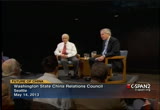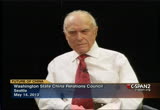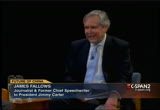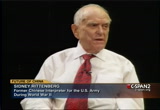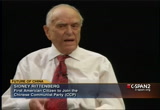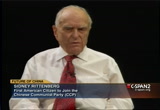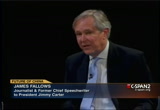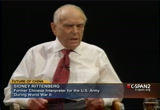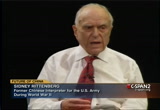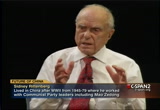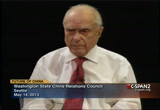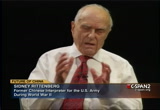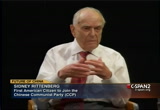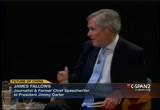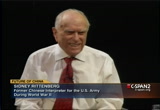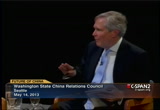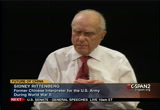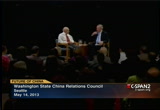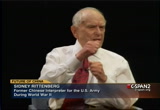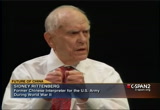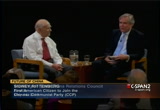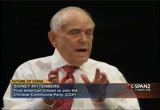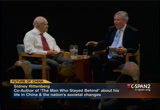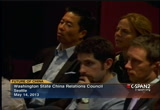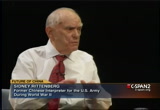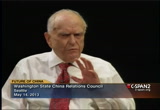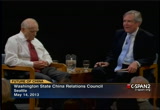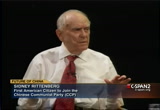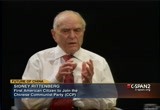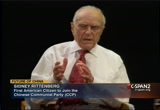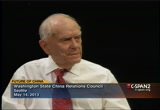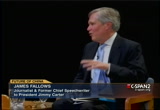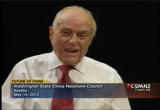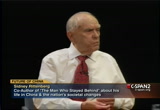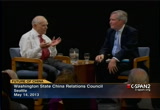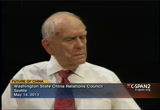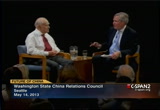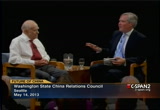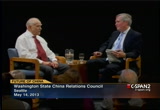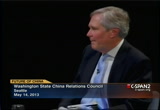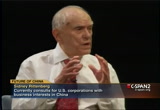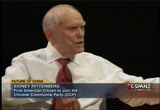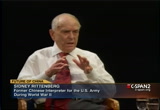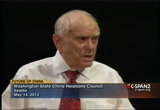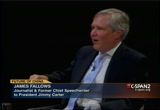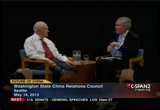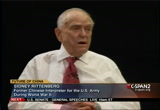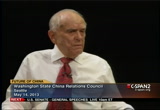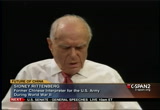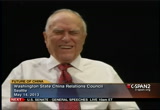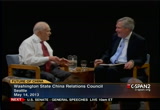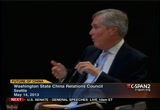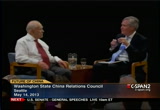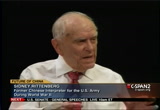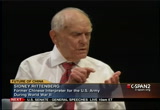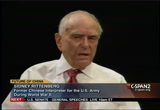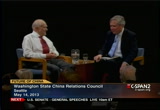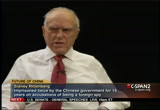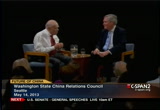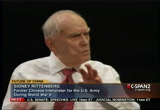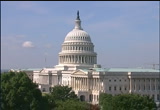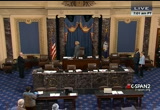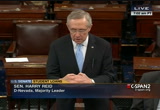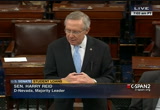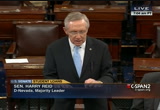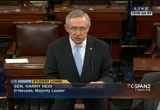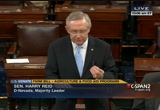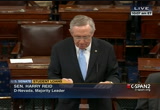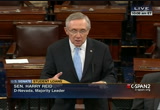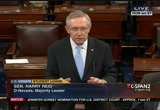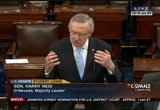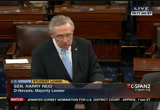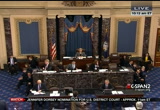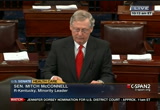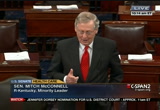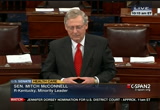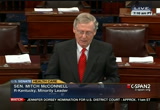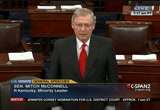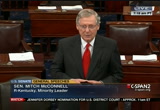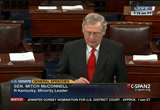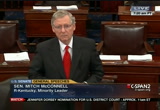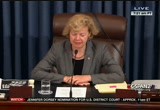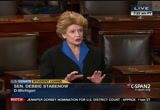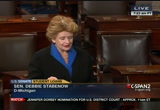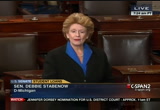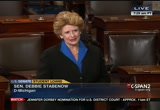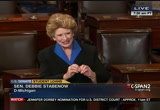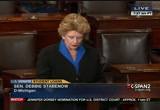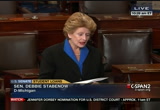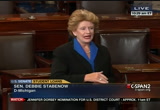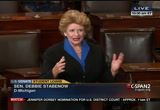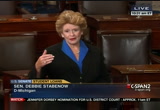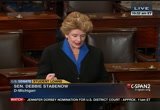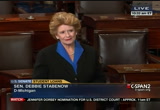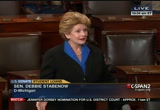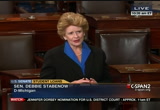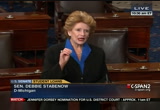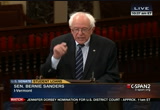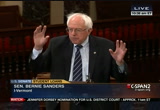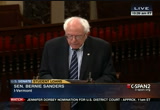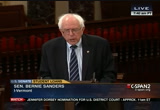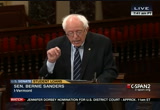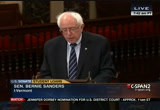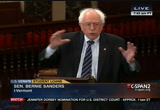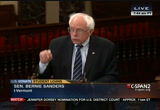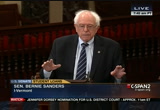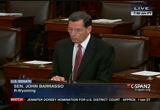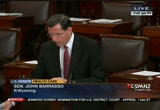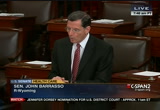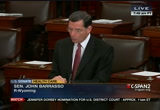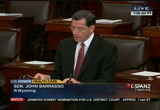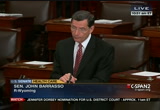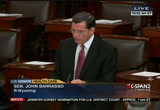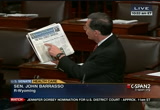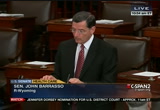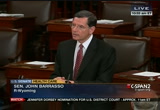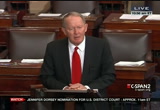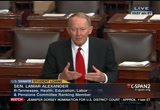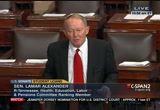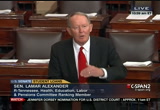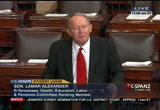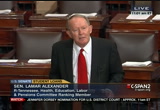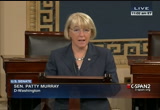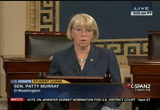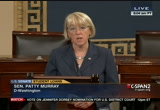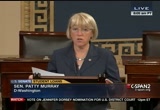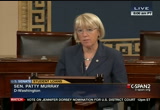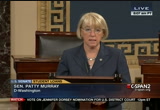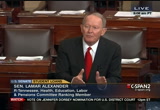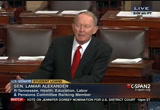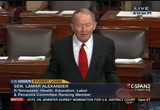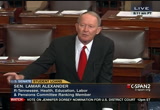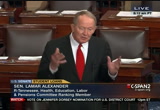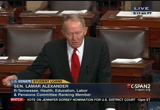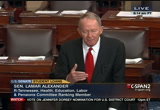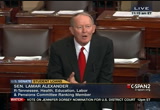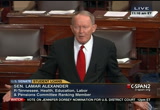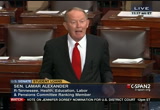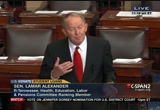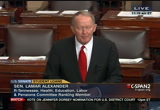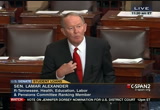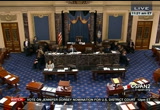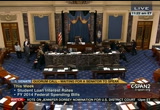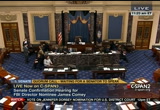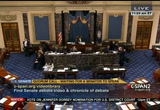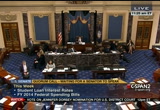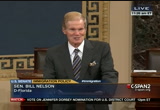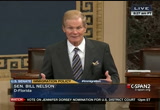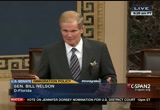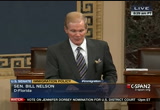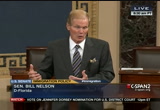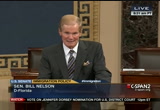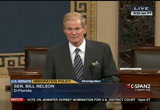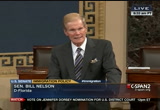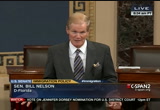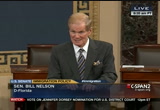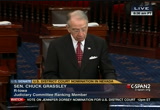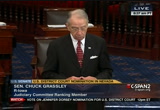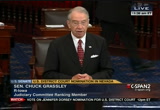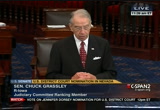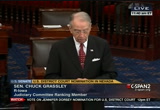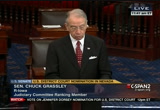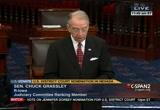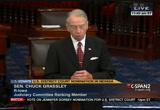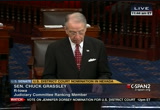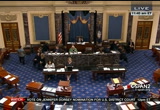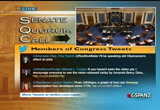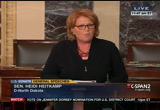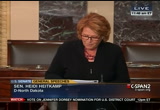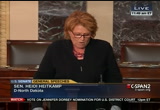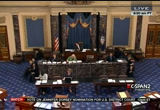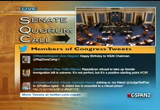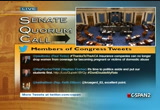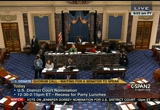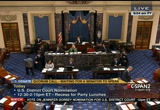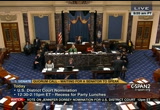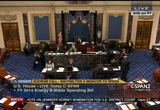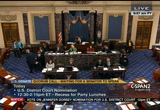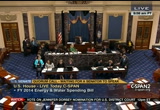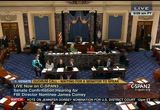tv U.S. Senate CSPAN July 9, 2013 9:00am-12:01pm EDT
9:00 am
sidney rittenberg who we're going to be having this discussion with for the next few minutes. i think there's nobody who is, has the personal range of experience that sidney has had in knowing the leaders of china during its revolutionary rise, also experiencing its hardships during his years in prison. there's no one who has the intellectual span he's had as a early marxist and a believer in the chinese communist party in seeing how the country has evolved in the years since then. and no one who has the historical range he has of having been there before there was a people's republic of china and probably being in there where it's celebrating its 63rd and 64th anniversaries as a republic. and his engagement in the subject is even this morning, i sent sidney a note late last night saying i'm in in seattle, we should talk before this gathering, what should we cover, and i got this very detailed 19-point note that exceeds in subtlety and sophistication what you'll read in any of the
9:01 am
newspapers. [laughter] so it's a real pleasure. and most of what we're going to cover this evening is at sidney's suggestion and my wish, too, the current state of china, its politics, its economics, its culture and as we look forward, things we can expect. but i'm going to do something he hoped i wouldn't do can. but anybody in the audience who has read sidney's book, "the man who stayed behind," and the part of the national audience too would think me crazy if i didn't ask this question. this book, i hope if you haven't read it, you will. it's a great book. it's insightful, it's riveting, it's dramatic. it tells you about parts of china that are different in the 1940s from what there are now and parts that are very much the same. but part of it is also the recording of 16 years in two separate episodes in solitary confinement in chinese prisons. and that's something that most of us or at least i don't think i could take. i have a hard -- there was one time when i was in korea about ten years ago, and i realized there was nothing around me in a
9:02 am
language i could read. nothing english, nothing in japanese, nothing in chinese characters, only stuff i didn't understand. i thought in 24 hours i was going to go crazy because i had no way to bring in extra information. for 16 years you were in this kind of circumstance. what, what did you learn about life by doing this that you want to tell us, those of us who have not had this, what is the moral you can give us about what you learned about yourself in 16 years on your own? >> with -- i think two different kinds of things. the first is that the things that i originally thought were so important that i couldn't live without, most of them were not really that important at all. and the one thing that i couldn't live without -- and now
9:03 am
we get into the second kind of thing -- was something that i think comes down to the general heading of integrity which is a unity of what you think, what you say, what you do. and also as part of in this the ability to learn to use reason based on the practical situation that you're in. to use reason to modulate your moods and your emotions, the harness your emotions to get behind positive ideas and keep them from dragging you down. and, you know, you learn this over a long period of time through a number of lessons. you gain in strength as you go along, and that's, it's a great thing to have. >> there's a ongoing theme in
9:04 am
literature or in philosophy of people looking back on life and wishing they could tell people, for example, welder's "our town," people looking down from heaven or wishing they could tell the still living toen joy the ordinary pleasures of their day. as you walk around and see people who have not been through what you've been through, do you want to shake them and say, look, pay attention to this? i've had to learn things about myself. do you want to give lessons to all of us? [laughter] >> i wouldn't mind doing that. [laughter] you know, and i have been teaching. but the fact is that it's not something you can insert into somebody else. >> yeah. >> you can try to create conditions and incentives for them to train themselves and hope that they will do it, especially i'm talking about raising children also. finish but you can't really put it into someone else. you messagessed thornton welder,
9:05 am
it's interesting, because i thought a lot especially the second time in prison during the cultural revolution. i thought a lot about another book by thornton wilder called "heaven's my destination," about a young man who was rooming long term in a brothel but all the time he thought it was a charitable home for ladies. [laughter] >> looking on the bright side. [laughter] okay. we may return to these themes later on, but for now i'm going to go in, i'm going to go into current events. as you know and as you've written and discussed, there's a new leadership in china for whom the hopes in china itself are quite high. i was in beijing for the last week as we were discussing, and lots of university students and others are talking about, yes, they thought that xi jinping and his comrades were going to do the things necessary for china's next step. basically, the poles of argument are whether these leaders are
9:06 am
able to change the system or whether the system is bigger than any people who are within it. how should we think about that tension? >> well, incidentally, i ought to explain that i do actually own a blazer -- [laughter] but i'm not wearing it out of respect for the new leader, xi jinping, who doesn't like to wear coats. [laughter] so i think what can we reasonably expect from the new leading team and what can we not expect, and in my view we can expect that they're going to work very hard and probably succeed in some substantial economic reforms. like opening credit from the big state banks to private industry and commerce. up to the present, private enterprise in china which is the fast growing and the most profitable sector by far in
9:07 am
order to get funding to meet your payroll, you cannot get it typically from the big banks. you have to go to the 18.5 to 35% interest. charges so if you can't make that, then you're probably going out of business. so i think that will change. another thing, i think they have determined to sizably shrink the amount of economic growth that comes from state investment. state investment for all kinds of reasons is enormously wasteful. and unproductive. and to build out the capital market which will include absorbing more foreign investment into the capital market. so that in the future, hopefully, most chinese enterprises will go to equityies
9:08 am
and fixed income instrumentses and so on to finance their growth rather than relying on papa to put up money. these are very big changes. also i think they will continue the try to move the focus away from exports and on to serving the domestic market. that's a market of there are probably 700, 750 million urban -- rural people who are still not really part of the modern marketplace. and they will, they will become so. in the next 1 is years -- 11 years, i think it is, they plan to move another several hundred million people from the villages into urban communities. not all big cities, but many big cities. and they think that's one of the ways out of poverty. so i think these things are
9:09 am
going to be very difficult to put through because the big conglomerates, the big state-owned monopolies usually are against it. because they're doing very well, and they don't want anything to change, and they certainly don't want more competition. from either china or abroad. but i think they will be able to push it through. i think xi jinping is a very energetic man. we -- his father was a very close friend, and his father was a very fine man. he was, he was the one when set up the special economic zone that's been so successful. he set it up, he fought for the favorable conditions, sold the idea to dunn sue ping was he was in charge. he's also the only one of all
9:10 am
the leaders who openly spoke out against the suppression around tiananmen square in 1989. he was that kind of man. therefore, he was always in trouble. [laughter] i think enough of the father rubbed off on the son to give us some reason to hope. and also as jim has pointed out, his -- the style, the new style that he brought into office with him has already managed to bin to overcome -- to begin to overcome the terrible political cynicism that has hung like a pall over chinese people, especially young people, for quite a long time. there's beginning to be a spirit, there's beginning to be a soul. i think on the debit side of the ledger what we don't know there is a marked expression of
9:11 am
nationalism in his, in his policies, in his remarks. the emphasis on the chinese dream, on the resurgence of the great chinese nation and also as has been manifest in the sort of extricep rouse attitude towards sovereignty in the south china sea as opposed to some of the southeast asian countries and in dealing with the dispute with japan other those pieces of rock out there. so this is something that i find a little alarming because that he uses a national spirit to unify and motivate people makes sense. but how far will it go? how well he will be able to manage it is a question that i have in my mind. >> i'd like to come back to these nationalism issues in a moment. first, i want the note the extra
9:12 am
value you get with sidney rittenberg that the father of the new president of china was a close friend. this is something you don't get in any normal conversation. [laughter] and i was, as i said, i was in beijing last week where people were saying that the restaurants were notably less crowded, and the traffic was notably milder than before because of this anti-ostentation campaign which suggested how many of the cars must have been big shots' cars, if it made a difference in the traffic. let me ask a question about the political trust. as you know, there's been a lot of argument as you just said, too, that questions of corruption, of inequality, of a rigged game, of the inequality -- the widening gap in the chinese system had made, there's a camp that says this just, this can't be, this can't be sustained. that unless xi jinpinging can really transform people's trust in the system, it's going to be another kind of crisis for chinese governance. how do you view that kind of analysis? >> i think that it can be
9:13 am
sustained, actually. he's made some moves already against a number of corrupt officials, some very highly placed, some above the ministerial level. which is encouraging to people. but there's no way that you're going to eliminate corruption from official china today. it's not going to happen. i don't know if you will be -- nobody here is old enough to remember. we used to have a lot of little audrey jokes. and one of the little audrey stories was little audrey took her mother's toothpaste and squeezed all of the toothpaste out of the tube. so her mother came in and put little audrey over her knee and spanked her. but as she was spanking, little audrey laughed and laughed, because she knew her mother would never get that toothpaste back in the tube again. [laughter] and that's the way it is. it's so, it's part of the system. however, the fact that the new
9:14 am
leading team apparently has been selected, all seven of them, partly because they all have a record of working against corruption, and they have put their probably most capable of all the vice prime ministers in charge of the fight against corruption, probably quite a lot will happen. but it's not going to fundamentally -- i don't mean to change the paper -- but it will show the public that these guys are trying, i think. that they mean what they say. >> and so to judge how they're realizing those ambitions, four or five years from now when the second term is coming and there's another five-year plan, what will be benchmarks that you would look at and say, oh, yes, he's been able to make good on some of these reforms versus things that show he's not being able to make progress? >> well, i don't -- first of
9:15 am
all, i don't expect a whole lot to happen in the way of political reform. i don't think -- i mean, the political system is not going to substantially change, i don't think. and after all, you know, the thinking it's created miracles in human history in these 30 years in terms of growth and improvement if people's lives, so why should we change it? but there are lots of things that are wrong that must be changed. and i think if they are able to carry out these economic reforms, if they are able to make corruption, you know, to give it a very, very bad odor so it has to be much more secret and to make some moves against powerful people who are corrupt, i think they will have moved a great way forward. i think as a result probably the
9:16 am
economy is going to continue to grow. >> i think the first time we first talked was five or six years ago when i was interviewing you for a story i was doing for the atlantic about a puzzle that remains in my mind still. and you were usefully clarifying then, but it's still a puzzle. the puzzle is why china and chinese government does such a bad job of projecting the country's realities to the world, and this is connected to political reform. there is, it seems to me, the greatest soft power china could have would be if more and more people actually went there and saw the variety of the place, the life of the people, all the things that are exciting and that make you think day by day, yes, this is horrible in many ways, but it's more vivid and appealing and things like that. but, of course, the government makes it hard to get visas. they have sort of official propaganda arms, and remember during the olympics ceremony, the foreign ministry opened up
9:17 am
an official protest zone, and then the security ministry arrested people who applied to protest. [laughter] so the question i was asking you is why is this balance so skewed to what i think of as the dick cheneys of china? [laughter] will there be a time that america will look bad to the world if dick cheney were in charge of our foreign presence, in my own opinion, and his counterparts, i think, in china always -- they've had the upper hand in terms of not letting the country relax. can you see china relaxing at some point? >> i think that is a very, very important point. because for so long finish not so much in most recent years, but for a long, long time the big bogeyman that people were told about was the threat of peaceful evolution being carried out by us in china. and i remember asking some of our friends in beijing what is
9:18 am
it you're concerned of evolving out of peacefully, you know? because in my view, and i said this, there really -- if you're talking about elements of socialism, it seems to me we have more here in the united states today than they have in china. so this is sort of been dropped as far as i can see. but i think the problem you have is largely cultural. this is, this is a country that has been locked off basically from the outside world for my hen ya. not just for centuries, but for millennia. and the cultural concept, i think, is very deeply embedded in lots of people that not the foreigners are necessarily barbarians, but that we chinese are the normal, and the aren't really -- they aren't really
9:19 am
normal. i mean, they're okay. they're okay. but we're what's normal. and, therefore, the idea of letting the not quite normal people get too deep into chinese affairs and interlock too much and be involved too closely is a quite foreign idea to lots of people. and i hope they're not going to -- i hope we're going to see fewer and fewer dick cheneys in china. [laughter] i mean, if i were god for a day, i would abolish the prop began that -- sorry, public security ministry and all that stuff. but hopefully, it'll get better with time, fewer and fewer friends will get shot in the eye and things like that. >> and to bring this to a specific case that as you know i've been harping on for a long time, it does seem to me that censorship of the internet is
9:20 am
both an illustration of this phenomenon and a deceptively much more important phenomenon than it seems because if china is aspiring to have really first rate world universities, first rate innovative corporations, the people who can build those things are not going to go to where they can't really use the internet. and there must be people in the chinese government sophisticated enough the realize that, right? so how will this be resolved? >> well, that's a problem. there are people sophisticated enough to realize. there are people who are definitely against this and try to work against it. but you're up against very powerful groups like the prop began that people -- propaganda people and the security people who are very much for it and who think recently the statement has been made on a meeting on national security that we have to tighten up in control of the internet and guidance of opinion. so there is this tension between
9:21 am
people that understand it and want to open up. but i think historically the more liberal open-uppers have been winning. i'll give you an example. when the pc first came out, it was banned in the soviet union, it was banned in many of these other countries. and in china the security people were dead set on banning it in china. except for a highly-controlled -- but the high-tech people and the education people and the more far-sighted political people said, no, we want everyone in china to have a computer, and they won. >> and so to be clear about this, you've said including recently that you don't think multiparty democracy is the right thing for china now and using some of our own trivials as illustration of what they might be afraid of. but do you think they have any legitimate reason of being
9:22 am
fearful of uncontrolled expression on the internet? if you were in charge, would you say open it up or not? >> i don't think so at all. i think you improve it by the fact that there are thousands and thousands of chat rooms in china, and some of them are really extreme. some are extreme left, some of them are extreme right. extremely against the government. but nothing happens. there hasn't been chaos because of that. i mean, there are lots of disturbances because of bad policy or crooked people, but not because of this. and i'm certain and we say every time we go to china if you allowed the press which is totally party-owned to have open debate on all political and theoretical questions, it would release tension. it would not build up tension. this happened in 1978 for a time before it was shut down, and it
9:23 am
didn't create any trouble at all. >> and one more question about these internal tensions. as you know, the number of documented uprisings is a huge number, you know, hundreds per day across china. it's impressed me the ones i've seen, they've always been appeals toal vegas, to the central government for salvation against local oppressor ises. do you view these as a safety valve or a sign of discontent? >> both, i think. it's both the scientists and safety valve. actually, the vice minister of agriculture several years ago said this to the press in hong kong, he said we are against disyou are disturbances, disruptions in public life and production. but there is a good side to them, and that is they bring our attention to bad things that are going on that we otherwise wouldn't know about. and then we can deal with them. well, that's a rather sunshiney statement because you can't deal with all of them, but i think
9:24 am
a's true -- but i think that's true. and it is very significant, i believe. not more than one of these 100,000 a year strikes, protests, marchs, petition campaigns, not one of them has been aimed against the central authority, either party of the government. they're all, as you say, to get the emperor to send his people down to deal with local bad guys. and so you could see it partly as a threat, but also partly as an element of stability really in a system that has serious hacks in political -- lacks in political. >> and in your observation over time, is the central government becoming more tolerant or more draconian in dealing with these? >> oh, they're definitely -- not only becoming more tolerant, but they've fundamentally changed their way of managing them. half a dozen years ago they
9:25 am
would still if there was a strike or demonstration, you would send in the cos acts and try to suppress it. and usually succeed. now they don't. they keep hands off in terms of force, but they send people in to negotiate, to conciliate. even three years ago the very serious truck drivers' strike in shanghai that blocked the main arteries of transportation and caused great losses, they didn't jump on anybody. they sent people down and negotiated until they got a deal that was acceptable. so that's a big change. >> i have a nationalism question now. i'm going to preface this by, as you know, deb and i with our then-kids lived in japan for a number of years during the 1980s, and i have two nationalistic questions. one is you very eloquently point out in your book how you were very deep inside the chinese system. you spoke chinese, you have
9:26 am
speech in chinese, you wrote chinese, but there was a certain point where you were foreign, and there was that barrier you encountered. still, i always thought how much more permeable chinese society was than japanese society because there's more room for foreigners than japan. question one is do you agree or disagree. question two is in the 25 years of going back and forth to japan -- to china from japan, i've been really struck about how the level of anti-japanese simple hay dread is going up and up and up. how should we be thinking about that, its origin, its potential consequences? >> well, i think on the first thing there's no question in my mind, i think there is as much difference between chinese and japanese mind item set -- mindset, if you like, as there is between japanese and american. on the surface it may appear quite similar but with, actually, very, very different. if you go to china and you deal with your guiled or whoever --
9:27 am
your guide or whoever, your talking partners, once you become acquainted and relaxed, they'll tease you, they'll cuff you around, they'll think up nicknames for you and so on. you could live in the japan for 30 years and not have that happen. [laughter] >> george w. bush, they always called me too. [laughter] >> there is a resemblance. >> thank you. i won't call you dick cheney. [laughter] >> on the other point -- >> about the mounting tensions. the mounting just kind of raw anti-japanese sentiment. >> yes. well, you know, it comes mainly now from people that have had, that never suffered under any japanese. >> right. >> a hundred years ago and that have had very few, if any, dealings with japanese. so, now, they may have heard some stories from the elders in
9:28 am
their family. not too many of those elders are still around though. so you have to conclude that this is really manufactured. of it is manufactured. it's what you get from your textbooks in school and from the movies. you know, if you watch chinese tv, there is a constant, every day there are war stories of heroic chinese fighting japanese and, you know, some of them are really grotesque. so this is manufactured and kept up. and that's part of what i was saying about it makes sense to cultivate a national spirit, but if it gets into cultivating hatred for other people, then it can be very dangerous. and in china it's interesting, when the anti-japanese campaigns of the last decade, let's say, start, typically they are
9:29 am
supported by the government. at least by the local government. and, but after it grows to a certain amount of vehemence and power, the government begins to dampen it and even the crack down. five or six years ago, the last big outbreak, it ended when they arrested, i think, 27 of the spokespeople in shanghai. so there was no fuss about that. so it's a double-edged sword. it's dangerous because it can have a, an evil effect on foreign policy, and it's dangerous because it can be a vehicle through which disgruntled people can attack the chinese government too. you're soft on japan. >> so i have a test you all can apply the next time you travel to either japan or china. you mentioned how as soon as you get to know somebody, they're kidding around or joking. ..
9:30 am
9:31 am
dwelling on historical slights? i know contradictions abound in china but would you talk about this contradiction. >> well, i think for one thing china niece thought, if you can say that, chinese philosophy has always stressed self-cultivation of the individual. that there are always positive and negative forces battling inside you and you want to learn use your own strong points to deal with your own weak points. that is the essential engine proving guess and this is a force in chinese thinking. this concept in dealing with what happens to me i think lots of people draw on that tradition on the other hand, hand off my country, that's a different story. the great slogan during the resistance to the japanese invasion, the great slogan was,
9:32 am
give back my mountains and rivers you know. it wasn't, it is predators in my hometown but give back my mountains and villages. get out of my country. that is a very powerful feeling. >> so in practical terms is the current skirmish between japan and china over these island, is that dangerous or not? >> i think it's extremely bad. i don't think there's a danger of war because neither japan or china has any intents going to war with anybody now adays. not the kind of people that cap at that putted into a strategy they oppose by incidents. so if there are incidents, there are miscalculations, i think they will get over them, they will get by them. i think the toxic effect however
9:33 am
is, is that i think it person you're turn ad great portion of the japanese public against china, which is absolutely unnecessary, absolutely unnecessary. most japanese had quite a friendly feeling toward china and now they feel, hey, what's going on? why are you sending ships to threaten us, locking us ton to our radar and so on? in china of course it stimulates this narrow nationalism. so it's hard to see why anybody thinks in china, why anybody thinks that this would be a good move. but i think it's part of a general feeling that has grown over the past few years that now we're a great power and we have to show the world world that
9:34 am
we're a great power. we have to stand up and be noticed but not vis-a-vis the united states. >> you anticipate my next question. >> no, not at all. i think they are very clear that that one of the cornerstones of their foreign policy is avoided confrontation with united states almost at any cost. >> we talked about relationship between china and japan which are becoming needlessly sour and hostile. i will offer the thornton wilderrish and pollyannaish, relations might have been better and smoother than they have might well have been. relations are well-managed on both sides. >> absolutely. >> what do you attribute that to and the two countries respective leaderships? >> there is a general sense in terms of our national interests that this is the only path that makes sense. that anything else not only
9:35 am
doesn't make sense but can be really very, very dangerous and stupid. so what politicians say in congress and so on is one thing or when they are campaigning for president even but what they actually do when they're in charge of national policy in the white house i think is quite different. i mean there can be lurches in one direction or another but by and large it's been a steady policy of finding common ground and expanding relationships in the, in the u.s.-china relationship. >> and there is a, we are living in beijing during the financial collapse in 08 and 09 and there was an unmistakable tone from a lot of chinese leaders then. not simply pride in their own economies being able to rebound more quickly than others and not simply justify combination of the u.s. financial shenanigans
9:36 am
that led this world into a whole but in a sense the baton had passed. the u.s. had gone into the ash heap of history. there is not that tone now but do you agree there was that tone for a while? >> yeah. there was that kind of circle of critics that were saying that and felt quite happy about it. then they decide, some of them decided they weren't sure whether they should be happy bit or not. because having some of that, 1.3 trillion of our dollars, they weren't sure would be good for the dollar collapse. >> there was a narrative too, you heard at the time, britain france, portugal, venice, spainings, holland had imperial moments and they were all relatively small countries overextended unlike the united states. what do you think the chinese strategic long-term view of their interests with the u.s. are? yes. >> and first of all they want a stable international environment
9:37 am
for them to reach their economic goals and, you can't think about that without thinking about u.s.-china relations and i think that is probably the main thing. also i think particularly this new leading team with she she ping. -- xxiping. >> major powers. >> really -- >> yes. >> we should show the show the word that the emergence of a new major power doesn't necessarily mean chaos and war and so on. think they're very interested in this trying to build it. that is why american politicians that go over there usually get a really great welcome, even the ones that aren't so friendly. >> so as i mentioned to sidney, i spent last week in beijing
9:38 am
with a number of senior security officials wearing the green uniform of the pla. that was very interesting. one of the theme that came through was the theme of strategic mistrust. the argument was given, for example, in iraq and afghanistan a large number about american troops have been killed accidentally by u.k. friendly fire, nobody except real anglphobes thinks this is crisis between the u.s. and england. any incident between the u.s. and china, embassy bombing in balkans 20 years ago is purposeful and no explanation is explained or accepted. what do you think are the main ground for chinese strategic mistrust of us and american strategic mistrust of china? >> well, i think in the case of their mistrust of us they went through a period of 27 years let's say, from 1949 until the
9:39 am
end of the cultural revolution in which we were the devil. we were the great satan and everything wrong with the world was attributable to american policy and people grew up with that idea and later, starting in 1960 we shared that honor with russians. they were also, a great satan. so, the relationship fundamentally changed but it takes time i think for that of building of mistrust to wear off. however i feel very strongly that at no time during the worst days, during the korean war or after, at no time but find ordinary chinese personally hostile to americans. i remember there was an incident, there was an american writer named felix green and we
9:40 am
went with him, i went with him to tianamen square where there was a huge meeting, students. must have been a million people in and around the square. they were, there was some agitation against u.s. imperialism, as usual and so felix wanted to go up under the gate tower and film the rally and so i sort of guided him through these young kid shouting slogans and then they stopped us and asked me, speaking chinese, asked me who this was. and i said he is an american journalist. they immediately fell back on both sides and opened the corridor for him to go up and film. i think americans and canadians have all this time have been favored foreigners in china.
9:41 am
you go to any chinese village and some little guy practicing his chinese, his english will come up and say, where you from? and you say america, and you get a big grin right away. >> personally our experience over the decades has been that we never really had any bad experiences based on being americans only on my own personal traits, not my nationality. so what does the u.s. legitimately mistrust about china now? >> i think that the u.s., we're talking about washington i guess, basically doesn't understand china, they really do not understand. i mean the thought, if you spend time in china the thought that the growth of china, including a certain degree of expansion of their military forces, that this poses a military threat to the united states, it just sounds weigh out in left field.
9:42 am
i mean there is no school of thought in china, as far as i know there never has been, a school of thought that argues, to solve our problems we need to go out and conquer other countries, never. the parts that used to belong to the emperor, that has been back and forth. that is a different thing. i don't think the chinese think that way, what we need is conquest, unlike little japan, that had that problem. so i think that we don't understand that and we don't understand their intentions. we know it's still called communist. and we don't understand there really has nothing to do with communism whatsoever. has a lot more to do with capitalism and also i think, unfortunately our china policy,
9:43 am
for politicians and people in congress, it tends to be behaved on not our national interests but on what they think will play well back home and get them votes. that is the tragedy of it. so there are some people, i will mention senator charles schumer. when he went to shanghai, had conversations in shanghai about china, it was like you were talking to a different man. you couldn't find anybody more reasonable and amiable and so on. but back in washington, full of fire. >> he was the head of young democrats in college. i was editor of a college paper. we were each set on a certain path years ahead. just on this point the one area where i think a elite level u.s. opinion is now most focused and suspicion of china is the cyber threat where china does seem to be different from others having sort of state-sponsored commercial espionage. what is your view of that? >> i had the opportunity to talk
9:44 am
with person in the fbi who is one of the people in charge of cyber warfare and, against cyber warfare. and i said to him, he just made a talk to a club i belong to about the terrible threat and influence of cyber warfare mainly from china. so i asked him afterwards, i said, isn't it true we're pretty good at that stuff too? he said, oh, don't worry about us. we're the best. [laughter] we don't talk about that. and -- >> i agree with that and the people i was talking with last week made that sam point too. i think point one the difference is, i don't think the u.s. uses state cyber for commercial ends which seems to be china's distinctive trait. maybe the way off this precipice, treat cyberattacks the way we used to do nuclear threats with the soviet union. maybe confidence measures.
9:45 am
>> maybe another geneva conference on cyber. >> or maybe something having the two sides -- the chinese last week, their first level response was, what? we're only victims of this sort of thing but we never heard of it but the second was to be open to this kind of negotiation. my expressed view on the biggest threat to china's continued development and the biggest problem china creates for the rest of the world is environmental. despoiling of all kinds. certainly what happened in china is the same in kind what happened in germany and london and l.a. when i was a kid and pittsburgh but the scale is so different from anything the world has seen before. can you argue grounds for optimism with china dealing with its environmental problems? >> i think the ground for optimism is that they now take it very, very seriously which they did not before and there is, you know, they're spending billions and billions to deal with it. however, it's already a presence
9:46 am
so you don't, you don't get rid of it just by spending money overnight. it is going to take time, but i think they will be able to deal wit in time. i mean it is critical now just to live in beijing is a danger to your health. it really is. and, if you checked the hospital records there you can see it manifest. >> certainly i have been witness to some of the efforts of people in this room, the china clean energy council and others are doing. there is a very dense, dense connection of -- cooperative efforts on this front. there are birth defect epidemics and cancer epidemics that is threatening to the stability of the regime the way some other things might not be. >> if the regime is very positive and persistent in dealing with air an water corruption i suppose that will be a factor for confidence, public confidence. but it's not,.
9:47 am
this is a one thing xiping keeps saying. empty talk will ruin us. practical action is what we need. >> we'll move to the lightning round for discussion. we have a few minutes for the public before we turn to all of you. i will ask you how should we think about the future of main mainland china and taiwan? there are those who say the status quote can go on indefinitely. others say it will be a provoked to crisis where the u.s. and china can not agree. 20 years from now, 30 years from now what do you think the relationship will be between the main land and china and taiwan? >> i think they will move to some confederation agreement, some association. for taiwan to become an actual province of china i think is difficult. would probably take a long, long time if it happens. that is not really necessary.
9:48 am
the saying what zeodung used to say, if we have one national anthem, one flag, one title for china and we don't send soldiers or police to taiwan. we woken send officials but their officials will come to take part in the central government that's okay. i think it may move in that direction gradually. so far it's okay the way it is today. seems to me it is pretty okay. >> so moving around the region, north korea, can and should china be doing more to control north korea? >> you know, i don't think it is about control. they have cut off some of the banking, some of the financing north korean banks and they have
9:49 am
stopped some of the exports. not the main thing, not fuel and so on. and they have made unpleasant noises showing dissatisfaction. but,. seems to me what we're working towards is a situation where. they do their best working their side of the street and we work our side of the street. it seems to me a key really is what ambassador dennis rodman -- [laughter] >> of america. >> that is, that we need to talk with them. it doesn't make any sense not to talk with people just because you disagree with them. seems to me that is exactly the time you need to talk. but we refuse to talk directly with the north koreans. to me that doesn't make any sense. this young guy there, he needs
9:50 am
recognition. he need recognition. mainly from us. so what would it cost us to give him a little recognition in terms of diplomatic talks and so on? it seems it me there is much more hope there than there is in further control from china because what the chinese are afraid of, certainly one thing, same thing washington is afraid of, they're afraid if you put too much pressure, the regime will collapse suddenly. then we'll have millions and millions of refugees and they're mindful what happened to west germany when east germany collapsed. they don't want that to happen. >> how about china's more broadly-defined responsibility as a major power in the world, whether it is north korea, whether it's syria, whether it is iran or sudan? will the klein niece leadership become more -- chinese leadership become more naturally accepting to requests to dot right thing in those areas?
9:51 am
>> i think they will. there has been a process where we and others have been sort of trying to coax them out, not to fear their influence. but to hope for them to participate in the solution of international issues that don't necessarily directly involve them. i mean the middle east directly involves them. so you don't have to invite them there. and so does north korea and so on. but it's a process because the tradition has been not to get involved if you can help it. the old chinese saying that, it's better to have one less thing than to have one more thing. you know and so i think it is gradually changing. also, they have to learn how to do, how to get involved in a positive way. it's not, not something that you're born with. >> what can the international community do in the case of
9:52 am
tibet to increase the cause of religious liberties in tibet? >> well, i think you investigate the actual situation and you publicize things that the religious community feels wronged there but i don't think anybody should be, suffer from the delusion that tibet is going to leave china and be independent. the dalai lama for almost two decades now has been saying, we don't want independence. we want genuine autonomy. the problem is that if you examine the proposal that they have made, it would amount to actual independence without being called independence and would take away 25% of the territory of china. so it's not that easy to do.
9:53 am
i think it's just going to putter along. some things will get worse, some things will get better until tibet is basically assimilated in the distant future. i don't see any other way. the monasteries are operating full blast. the only problem is that the monasteries are controlled by a committee of the communist party who are supposedly atheists. it is kind of awkward to have a religious monastery which is run by a bunch of atheists. so these things i think can change and i think pressure really, really fact-based, targeted pressure to change these things can be effected but i don't think support for tibetan independence is effective. i think that makes it tougher. >> one more specific question.
9:54 am
i will ask you a wrapping up question. chinese universities are expanding at a ferocious pace. they're turning out engineers more than the rest of the world combined. this is expansion in volume that will never attaining international quality levels under the current system. censorship and internet and control of the press you can't have first rate universities under those conditions. how do you view that issue? >> certainly you can't just look at quantity. the quality of of many of the graduate engineer schools can't be compared to our guys and gals, that's true. on the other hand, there are really brilliant people coming out of those schools and we've seen some of them in action. really, really brilliant people in all areas of high-tech, whether it is nano science or electronics or whatever. really impressive and not only graduates of engineering schools but young high school graduates
9:55 am
who have learned stuff on their own and it really is phenomenal. so -- >> this is your chance to give us the big picture which i will set up this way. you were born and raised in south carolina. you went to the university of north carolina. world war ii you were very involved in racial justice battles and labor justice battles and all the rest. so you've seen your original home country over this span with its liberalizations, it richness and also its sclerosis of various kinds. you've seen china over that span too starting in the 1940's from now where it has gone from this war-torn area to a rich society a major power but don't call it a great power at least in front of its officials. how would you compare the successes of these two societies as you've seen them in, in your lifetime? they have each, you have watched your home south transform.
9:56 am
how do you feel about america's progress over your lifetime versus china's? >> the transformation of the south is phenomenal. we went back to charleston for the first time in 1979 and i saw these young students at the college of charleston, black and white, walking down the street holding hands, boys and girls. i said, now that's a real revolution because you would have been killed, absolutely killed if you would have appeared on the streets like that when i was living there. but generally speaking i don't think our progress compares to the progress of china. i mean that country, when i bottom to china 1945, later according to the united nations statistics, 70% of the people in that country were hungry. i mean hunger was the normal state of existence.
9:57 am
if you asked a country person, you know, say what do you do? he often, he wouldn't say, i'm a farmer. he would say, meaning i suffer. suffering was a common word for farming. and what do you live on? we live on grain half the year and chaff the other half. meat, eggs, poultry? out of the question. not even on chinese new year. on chinese new year, you would have dumplings but with cabbage or something inside. no meat. and, the change now is absolutely phenomenal. and it keeps changing. and the, the feeling of momentum, and i think you expressed this very well in your book, in china airborne, the feeling of forward momentum in the chinese people is so
9:58 am
powerful, that's what's really impressive. even though they may be very dissatisfied with lots of things in their life and the government and so on, we, last year, we were in a little, probably a phony apple kiosk in the big arcade there, court of miracles in beijing and they had the new ipad before the apple store did, lots of them. [laughter] and genuine article. not counterfeit. and i asked the, woman proprietor, where, how do you get them? she said, we don't know. they bring them in in suitcases and we buy them. so, then i said, i said, you know, some people think that in five years your gdp will be larger than ours. and she immediately said, oh, it won't take five years. you can't get that response from anybody in this country today i don't think. not like that.
9:59 am
so, i think that the progress there has been qualitative, enormous. the problem that, the progress in our country, aside from the change in race relations, has been sort of just bricks. >> but bricks were higher to begin with. with that, i would like you all to join me in thanking sidney rittenberg for this extraordinary conversation. [applause] >> the u.s. senate is about to gavel in for the day following a period of general speeches. at about 11, the chamber will take up the consideration of nomination of attorney jennifer dorsey to be a u.s. district court judge in nevada. votes on her nomination are scheduled for noon eastern.
10:00 am
members will recess from 12:30 to 2:15 for the weekly party luncheon. legislation on the recent doubling of interest rates on federal subsidized student loans that took place on july 1st and possible work on federal spending bills for 2014. live coverage of the u.s. senate here on c-span 2. pray. lord god almighty, recreate our hearts to love you above all. rule our lives, creating in us a passion to do your will. give our lawmakers renewed strength and resilience to honor you in their work.
10:01 am
may they do their best today as an expression of love and gratitude to you. lord, replace weariness with well-being, anxiety with assurance, and caution with courage. we pray in your great name. amen. the presiding officer: please join me in reciting the pledge of allegiance to the flag. i pledge allegiance to the flag of the united states of america and to the republic for which it stands, one nation under god, indivisible, with liberty and justice for all. the presiding officer: the clerk will read a communication to the senate.
10:02 am
the clerk: washington, d.c, july 9, 2013. to the senate: under the provisions of rule 1, paragraph 3, of the standing rules of the senate, i hereby appoint the honorable tammy baldwin, a senator from the state of wisconsin, to perform the duties of the chair. signed: patrick j. leahy, president pro tempore. mr. reid: madam president? the presiding officer: the majority leader smed. mr. reid: i move to proceed to calendar number 124, the student loan -- the presiding officer: the clerk will report. the clerk: motion to proceed to calendar number 124, s. 128, a bill to amend the higher education act of 1965, to extend the current reduced interest rate on undergraduate stafford loans for one year and so forth and for other purposes. mr. reid: following my remarks and those of my republican counterpart, the time until 11:00 will be equally divide you had and controlled with the majority controlling the first half, the republicans the final half. at 11:00, the senate proceed to executive session to consider the nomination of jennifer dorsey. at noon there will be a roll call vote on confirmation of the dorsey nomination. i would also add that the
10:03 am
chairman of the judiciary committee has asked that i -- that we hold that vote open until 12:30 today, because they're having a confirmation hearing on the new director of the f.b.i., mr. comey. so we will do that. so the vote will end at 12:30 rather than 12:15 or 12:20. following that vote, the senate will recess from 12:30 to 2:15 for our weekly caucus meetings. madam president, in america, this great country of ours, quality education is the surest path to the american dream. now, when i was a boy, we always looked at that american dream as getting a college education, which from where i came didn't happen very often. but now that american dream is more than just getting an associate's degree or a bachelor's degree. it involves many other occupations, all the things
10:04 am
available in health care now -- nursing, nurse's assistants, all the technicians, the people who do physical therapy -- not physical therapists, but people who help doctors do what they -- we have programs. you become a physician' physicis assistant, many programs that are important to fulfill that american dream. all kinds of different programs for computer training, separate and apart from getting a bachelor's degree. those programs are extremely important, and the reason thatter this a important is we as americans have decided that with the cost of education skyrocketing as it is, students should get some help, whether they're seeking a degree in engineering or getting in a program that they can begin some computer training to have a job that they want for the rest of their lives. but, madam president, college has never been more expensive
10:05 am
and further out of reach for american families. that's why it's critical we keep interest rates low on federal student loans, so more promising students can realize their dream of an education. last month republicans rejected democrats' plan to freeze student loan interest rates at current levels for two years without adding a penny to the deficit. because of this obstruction, loan rates doubled on july 1, piling thousands of dollars more of debt, mor that more than 7 mn students owe. republicans are push planning to balance the budget right on the backs of struggling students. if the legislation passed by house republicans or the plan by senate republicans becomes law, student loan rates would more than double over the next few years as interest rates increased. the speaker, speaker boehner, has said that the house has acted and now the ball is in the senate's house. we talked about that yesterday, madam president. what is he talking about? they've acted and now we should
10:06 am
act. i guess we could talk about what he this didn't do last year on the farm bill. i guess we could talk about what they didn't do last year on the post office. i guess we could talk about what they haven't done this year on the farm bill. we could talk about what they haven't done that is so devastating to small businesses around america; that is, having people who are online who don't build a single building, rent a single building, they get a different rate of return than do those brick-and-mortar build, they do that because they don't have to pay sales tax. we could talk about why the speaker is refusing to take up something that's meaningful. as i say about this student loan thing -- i've said this -- i just had a meeting that ended a few minutes ago. if you can explain to me why these proposals that the
10:07 am
republicans have are better than just having the rates double, please explain that to me. but they go into all these gyrations about whether it's a t-bill that's over-- an overnight t-bill or 30 days or six months, all this complicated stuff. it is factual. i met with met someone from the white house. it me what was in three years. oh, the rates would be above 6.8%. that's a be pro. if swrun can show me ow -- if someone can show me how all these programs, tell me. we have a imert proposal. instead of pushing plan to balance the budget on the backs of struggling students, i think we should support a plan that would be better for students, not worse for students. i repeat, we can't support a plan that would be worse for students thank doing nothing at
10:08 am
all. we have to take action. the rising price of higher education means too many young people are deferring higher education. i hear all of the stories, madam president, well, education used tock cheaper. well, because of what's happened here in the washington with the obstruction we've had to help people, there's been less support of higher education from the states. tuition costs have risen significantly because of that. students need help. we have to take action. the rising price of higher education means too many young people are deferring higher education. and it has saddled many who do get a degree with unsustainable debt, debt that causes them to delay buying their first home or even having children, or give up on starting a business. americans have more than $1 trillion in student loan debt. the average graduate owes more than $25,000.
10:09 am
in fact, americans have more student loan debt than credit card debt. they simply can't afford to pile on even more. we're going to continue to fight to keep the student loan rateslloy, hold back -- rates low, hold back the risin risinge of education. tomorrow we'll vote to keep rates low for additional year. i really admire the work done by senator stabenow, chairman of the agriculture committee. she is someone who is very effective in conveying a message. she has led the message for we democrats as to why we shouldn't let these rates double. she will continue to do that. now we, as i indicated earlier, we made a proposal to keep rates where they are for two years. we've made changes to our proposal in an effort to meet republicans in the middle while protecting students. our plan shortens the extension extension from two years to one year. and it doesn't add a penny to the -- to the debt.
10:10 am
i spoke to max baucus, i i said, explain how we're paying for this. it is so simple. it is inherited ira's that they would pay after five years. they wouldn't get the tax deduction after five years. what our program does, it closes this obscure tax loophole that allows a few very, very wealthy individuals to avoid paying taxes on inherited retirement accounts. that's why senator baucus came up with this as pay-for. i hope republicans would block us by keeping college affordable. we reduced from to a year from two years because it would be great if we had a long-term solution to this, madam president. but we can't do something that hurts students very quickly. some have said, well, it's going to be for a year or two, lower
10:11 am
interest rates. but, yeah, after that it's a katie bar the door. we all know that interest rates are going to go up. on another topic, before the lunch, as i've indicated, we'll consider the nomination of jennifer dorsey to be a united states district judge in the district of nevada. she will be a valuable addition to the federal court system. she is a las vegas native, her father was stationed at necessarily list air force base, after vietnam decided that's where he wanted to make his home. he started his family there. ms. dorsey graduated from schaap religion high school and graduated cum laude. she is also the first member hef her family to graduate from college. she attended pepper dine university law school, where she was a member of the law review after graduation, she accessed
10:12 am
at a law firm, longtime very proud nevada law firm. she is the first and only female partner in that firm. she specialized in civil litigation, complex commercial disputes, appeals, and class actions. i'm very impressed with her dedication to the state of nevada, the community and the legal profession. she will make an outstanding federal judge for jeff. -- for nevada. i look forward to her confirmation. mr. mcconnell: madam president? the presiding officer: the republican leader. mr. mcconnell: over the years we've seen repeated instances of
10:13 am
indifference to the rule of law on the part of this administration. it's a consistent and worrisome pattern. most recent example, of course, was just last week's announcement this the president had simply decided not to enforce a major piece of his health care law. that is, until after the midterm election. what the president was saying, in effect, was that if he doesn't want to implement the law he signed, he doesn't are to. -- he doesn't have to. if he doesn't want to implement the law he signed, he doesn't have to. i agree, it is a terrible law. i understand why people harmed by it would want it changed. in fact, i think we ought to repeal it altogether and opt instead for real reforms that would actually lower costs. for now, at least, it is the law. and it is the president's constitutional duty to enforce the law. yet instead of fulfilling his basic duty of his office, the president seemed seems to
10:14 am
believe he gets to decide who is subject to the law. he gets to decide who is subject to the law. and who gets a pass. so last week businesses had their obamacare sentences delayed. maybe next week it'll be some other group. but it is his call. he'll decide what the law is. he did it with immigration. he did it with welfare work requirements. and he did it with the nlrb when he took it upon himself to tell another branch of government when it was in recess. and nowes a doing it again with his own signature health care law. imagine that the current occupant of the white house was not president obama but a republican, just imagine that. pretend that this republican had come to office promising an era of inclusion and accountability. but as the years wore on, he
10:15 am
simply had grown tired of the democratic process. imagine that this president, despite securing confirmation for nearly every nominee he submitted, couldn't understand why the elected senate didn't sumly rush them all through even quicker. he couldn't understand why senators insisted on fulfilling their constitutional obligations to scrutinize each nominee. just visualize for a moment that this president decided to urge members of his party to break the rules of the senate so that he could appoint whomever he wanted regardless of checks and balances. imagine the outrage in the media, online and especially on the other side of the aisle. they'd claim the president was a dictator. they'd say he was ripping the
10:16 am
constitution to shreds. basically everything they said for so many years about president bush. but of course president obama isn't a republican, and so washington democrats seem just fine with it. in fact, it appears they're even ready to help this president -- actually help him -- in his partisan power grab. i know washington democrats are getting a lot of pressure from big labor bosses and from other far-left elements of their base to do this. these folks have told democrats it's time to pay up, and they don't have much time for things like the democratic process or the rule of law. they raised a ton of money for democrats, and now they want special interest treatment and believe it is owed to them. that's why we see the other side cooking up phony nomination fights.
10:17 am
phony nomination fights because they don't want to go -- they're cooking up a phony nomination fight because they want to go nuclear, but they know the facts simply aren't on their side to justify doing so. they know their core argument that president obama's nominees are being treated less fairly than those of president bush is essentially at odds with reality. a complete fiction. they've gotten burned by the fact checkers already. president obama's nominees for secretary of transportation and energy unanimously confirmed. secretary of the confirmed. treasury confirmed. interior, defense, commerce: check, check, check. already in this congress the senate has approved 27 of president obama's lifetime appointments. that compares to just ten at a comparable period in president bush's second term. by the way, my party controlled the senate at this point in president bush's second term.
10:18 am
he got 10. president obama has 27. in other words, president obama has just settled back into office and already he's secured nearly three times -- three times -- more comparable judicial confirmations. look, to justify doing something as extreme as the left wants, you'd better be prepared to make a rock solid case. and this is the best they can come up with? that we need to change the rules of the senate because big labor bosses say so. that the left should be allowed to fundamentally change our democracy because the president is only getting nearly everything he wants -- nearly everything he wants rather than everything he wants at the exact moment he wants it?
10:19 am
let's get real here. this is not how a democracy functions. if this were a republican president and the shoe were on the other foot, does anyone -- anyone -- seriously believe that washington democrats would be going along with something so preposterous? utterly preposterous. of course not. remember, the current majority leader once said the nuclear option would -- quote -- "ruin our country." that was said by the fellow who sits right over here, the current majority leader of the senate. and a former senator from illinois named obama said if the senate broke the rules to change the rules, the fighting, the bitterness and the gridlock would only get worse. he was right about that. so what i'm saying to president obama and his friends on the far
10:20 am
left is this: the facts show you're getting treated pretty darned well on nominations as it is. but if you'd like more confirmed, if, for instance, you want the senate to confirm your nominees to the nlrb, don't send us nominations already been declared illegal by the courts. don't send us nominees that have already been declared illegal by the courts. we've already said that's not going to happen. you know you can't look americans in the eye and say you'd vote for such a thing if you were in the minority. so don't expect us to. but if you send us fresh picks, we'll happily give them a fair hearing just as we've been doing all along with all the rest of the president's nominees. almost all of them have been confirmed. most of them have been confirmed
10:21 am
almost unanimously. because we in america know that majorities of either party will never get absolutely everything they want. that push and pull is the hallmark of a healthy democracy. and it's more to remember that one day, maybe not in the too distant future, when our friends in the majority invariably return to the minority, i suspect my democratic friends will thank us for standing up for those democratic rights. madam president, i yield the floor. the presiding officer: under the previous order, the leadership time is reserved. under the previous order, the time until 11:00 a.m. will be equally divided and controlled between the two leaders or their designees with senators permitted to speak for up to ten minutes each, with the majority controlling the first half. ms. stabenow: madam president?
10:22 am
the presiding officer: the senator from michigan. ms. stabenow: thank you, madam president. madam president, i rise today because tomorrow in the senate chamber we will vote on whether or not to let student interest rates double from 3.4% to 6.8%. this should not be controversial. this should have been done before july 1. now we're trying to retroactively fix this. we have attempted to bring this to the floor and vote on it before on a number of occasions. we've seen a republican filibuster blocking us from doing that. this week i'm hopeful we can get the necessary votes, get a bipartisan vote to overcome the filibuster and be able to send a very strong message to students across the country that we understand that this is a huge issue for them and their families, a huge cost, and raising the rates will only be another barrier to creating
10:23 am
opportunity for students in the future, and frankly, having a middle class in this country. what is happening to students and the debt involved is very, very serious and stopping many young people from being able to move ahead and being taoeubl achieve their -- being able to achieve their dreams. at a time when interest rates for everything else are at historic lows, everything else, why in the world would we double the interest rates for young people or older people going back to school who are trying to get an education and the work skills that they need? why would we allow that when you can get a mortgage right now from 3.5%, 4%. you can get a car loan for about 4%. we go on and on. and here's the shocking thing. if the rates are doubled, if in fact what kicked in on july 1 is allowed to stand, it will mean a huge profit for the federal government, which also makes no sense. some $50 billion, concurrent
10:24 am
resolution the congressional budget office -- some $50 billion according to the congressional budget office. why should the government of the united states of america profit off the backs of students who are struggling to get an education so that they can get ahead? we have a fundamental disagreement in this body between the majority of democrats and the majority of republicans on that question. it's a fundamental difference about what we should pick as a priority for our country. and, frankly, for nearly 300,000 students in michigan who are going to be forced to pay an extra $1,000 on their loans this year, it makes no sense. i remember tkpwr-g -- growing up in a little town in northern michigan working hard, getting good grades in my small class of 93 people, being at the top of the class, and wanting to go to college, and my dad got very
10:25 am
ill. we couldn't afford, madam president, for me to go to school. the first one to get a college degree in my family. i went to school because of the value at that time by the state of michigan and the federal government that kids like me who didn't have a lot of money but had worked hard and had good grades ought to have a shot. i had a tuition scholarship and i was able to go to college. put that scholarship together with working on campus, with student loans, i was able to get a bachelors degree, able to go on and get a master's degree, came out and had to pay the student loans. but because some kids who didn't know this red-head, freckle-faced kid from claire decided this is an important value for america, this is an important value for our state, i had a chance to work hard and follow the rules and make it. and who would have thought i'd have the opportunity to be here today. i want that opportunity for
10:26 am
every young person in michigan and every young person, every person going back to school in this country. fundamentally that's what this is about. it's not about numbers. it's not about numbers. it's about whether or not when we see that we subsidize all kinds of things -- banks and even the farmers that i fight for, we help them with their crop insurance. we do all kinds of things where we subsidize rates or insurance to be able to do things because it's good for the economy. why in the world would we walk away from that with students, the most basic set of values? colleagues on the other side of the aisle say let's do something where we peg a rate -- it's like credit loans, teaser rate. sign up now, zero interest or 3%. let's put it there and then over time it balloons like crazy and you're stuck. those are the kinds of proposals we got from the other side of the aisle. sound good now, horrible later.
10:27 am
i know a lot of folks who signed up for mortgages, variable rate mortgages and balloon mortgages ended up in the same situation. we're saying no, we want a fixed rate. we want it low. and we want to make sure students are placed as a priority. and so after all kinds of negotiations, we said okay, you don't want to continue the rate for two years. let's do this. let's continue it for one year at the low rate of 3.4%. then let's all get together and figure out what to do about helping those with $1 trillion in debt right now. that's the interest -- that's the student debt across this country. help them figure out how to refinance at lower rates. and let's deal with the long-term costs. that's what we are trying to do. it doesn't make sense when savings and loan debt in this country is over $1 trillion -- when student loan debt in this country is over $1 trillion, when students are already sacrificing and scraping to try to get money, it does not make sense to double the rates on
10:28 am
those student loans. when we look at this, we are looking not only at today but over time. and every proposal that's been put forward -- and a lot of folks working, i know that there's conversations going on that folks that want to solve this problem, but all of them end up with the rates going up higher than even doubling the rates to 6.8%. why does that make any sense? why would folks propose that? we have a fundamental difference in how we view this issue of the cost of college and whether or not there is a role for the federal government. do we as a country have a stake in keeping costs as low as possible, interest rates as low as possible? i would argue, yes, we do. and if we want to start subsidizing things, i think there's a whole long list of things we could stop subsidizing. we could stop subsidizing the top five wealthiest oil
10:29 am
companies in the country who have more profits than anywhere else in the world. we give them tax breaks and credits and we could stop subsidizing them. we could stop -- create -- we could stop the loopholes that are taking our jobs overseas. there's a lot of things we could stop that would save money. we should not put all of this on the backs of students and say somehow we should make a profit to pay down the debt on the backs of students when in fact there are so many other areas where we should be asking people to chip in a little bit more, not those that are already working hard to get a basic education. we know that we have to have a comprehensive approach. but until that work is done, we should keep interest rates low. we should keep them where they are. and then i have great confidence in chairman harkin and his committee and senator jack reed, who has taken a lead on this so passionately. senator kay hagan and senator
10:30 am
reed are leaders on the bill we will be voting on tomorrow. senator warren; so many others. senator boxer who has spoken out so many times. senator sanders, the presiding officer, we all care passionately about creating a long-term interest rate for students to keep costs low so we can keep dreams high and success high in achieving those dreams. i'd like to read two of the many, many e-mails, thousands of e-mails that i received that i want to thank so many for signing petitions and sharing their stories with us, and i'm -- i would urge folks to get involved in the competition, or the conversation, i should say, by joining us on twitter with the hashtag don't double my rate. there's a lot of conversation going on, information folks can find out what we're doing. i want to read two e-mails from constituents of mine in michigan. the first is corey, a student at central michigan university who
10:31 am
sent me an e-mail about how this would make it difficult for him to continue his education. and he wrote, "as one of the taxpayers that you represent, i'm asking to you please not allow my student loan rates to be doubled. i'm a hardworking and respectful student. i make all of my payments. i go to class, i do well. i work hard and am grateful for the chance to get a higher education. but if student loan rates go up, i will be left to make a decision whether or not school will be affordable." that story can be replicated all across michigan and all across the country. will young people be able to stay in school? will they be able to come out of school and get the job they want versus aiming for a job that relates to their ability to pay back their student loans. all kinds of choices. for the first time, we're starting to learn that young
10:32 am
people are making tough choices about whether they can buy a house when they get out of college. what other options will be available for them. he writes, "from the time we first start learning, we are encouraged to attend college and get a good job so that we can be a part of helping this country grow. i'm simply asking you to help continue to make this an affordable option for me and for many others like me." that's what the vote's about tomorrow. and then secondly, an e-mail from matthew in royal oak: "students are not asking for a bailout like the one that wall street got." let me say that again. "students are not asking for a bailout like the one that wall street got, just an opportunity to obtain an affordable education so we can compete in the global economy." ms. stabenow: that's what this vote is about tomorrow.
10:33 am
the keep student loans affordable act simply says we're going to tackle this very serious issue for families across the country in two steps. keep the interest rate low -- keep it where it is for a year -- and then make a commitment to work together to fix the larger issue of the costs of college going forward. i don't think there is a more important issue for the future, for maintaining or recreating a middle class in this country than making sure we can allow everyone to wants to go on to college and get the skills they need to be successful in tackling and meeting their dreams than to make sure that this is affordable, that college is affordable. and a big piece of that is what will be the interest rate on the loans that millions of students are taking out right now and
10:34 am
counting on us to make sure they are affordable. so i'm going to now turn -- i believe i have colleagues. i know that there are colleagues coming. senator sanders is coming, and so i will continue for a moment until he arrives. i don't want to interrupt his time but let me say, madam president, that tomorrow the question will be whether or not a filibuster continues on this issue. and i think folks probably scratch their head. we have a majority of people that voted, all democrats, before to continue the interest rates at the current level of 3.4%. because of the nature of the senate and how things work, if there is an objection, we have to go through this process to be able to overcome what is essentially a filibuster and you
10:35 am
have to get 60 votes. so tomorrow we're going to have to get 60 votes, which means that we need a handful of republican colleagues to join with us to make a statement that we should continue interest rates at the low level while we work together in a bipartisan way to solve the long-term problem. and when i think about the fact that we have over a trillion dollars in this country in student loan debt, which is more than credit cards. i was surprised to see that, frankly, with all the credit card debt we all have. over a trillion dollars. we've got to help families tackle that. i'd like to see refinancing options when interest rates are so low, and many of those are much higher interest rates. we need to tackle that. we need to tackle the overall costs of going to college. and what's happening for low-income students as well as
10:36 am
middle-income students. so there's a lot to get done bt it has to start by doing no harm, and that's the vote tomorrow. do no harm. let's make sure we at least keep the rates low now. we know that there's a philosophical difference about whether or not we should actually help subsidize student loans. i think of all the things that we could subsidize, to me i'd start with education. i think that is incredibly important. and tomorrow the question is, do we do no harm, do we keep the interest rate where it is while we work out a long-term soluti solution, and do we make a very strong statement that if we're going to set something as a priority for this country, if we're going to outcompete, outeducate in a global economy, it has to start with making sure education, advanced, higher education is affordable for everyone who wants to work hard and play by the rules and go to
10:37 am
college. that's what the fight's about. that's what the vote is about tomorrow. i hope we will have an overwhelming bipartisan vote. if not, we're going to continue to do everything possible to tackle this issue because i think families across america are counting on us. i yield the floor. mr. sanders: madam president? the presiding officer: the senator from vermont. mr. sanders: madam president, over the july 4th recess, i had the opportunity to talk with a number of vermont families about the crisis of student de debt. and without exception, this is what they said. they said, please do not double the interest rates on subsidized stafford loans from 3.4% to 6. 6.8%. please make college financing more affordable, not more expensive. madam president, this is an issue which not only impacts millions of families, it impacts our entire future as a nation and our economy.
10:38 am
right now working-class families all over this country are asking themselves a very simple question and their kids are asking the question: does it make sense for them to go $40,000, $50,000, $100,000 in debt in order to get a college education. and what many of these young people and families are saying is, no, it doesn't make sense. so in a competitive global economy, what we are saying to families all over this countr country -- we do not want your kids to get a college education, we don't want them to become doctors or nurses, business people, scientists, teachers. we don't want them to expand their intellectual capability and make us a competitive nation
10:39 am
in this highly competitive global economy. now, if that makes sense to somebody, it surely does not make sense to me. madam president, the doubling of student loan interest rates only makes an existing crisis even worse. according to a report by the consumer financial protection agency, the total student loan debt in the united states now exceeds $1.1 trillion, which is nearly triple what it was in 2004. the average loan balance for american graduates has increased by 70% since 2004. average student debt is near $27,000 in vermont -- is near $27,000 in vermont. it is even higher, over $28,000.
10:40 am
madam president, the burden of student loan debt is making it much harder for young people to get mortgages and buy homes. homeownership rates for young adults are among the lowest in decades. young people are putting off marriage and having children partly because of the burden of student debt. madam president, over the last several months, i have asked vermonters and people, in fact, all over the country to send me their experiences, to tell me what this crushing debt of student loans means to their lives, and we have received over 700 responses from all over america. not just from vermont but from all over the country. and what eye like to do is very briefly read to you some of the responses that i received from the state of vermont. emily decker from colchester, vermont, rights -- and i quote -- "watching the interest eat away my savings every month
10:41 am
is hard to swallow, to the point where we are not saving any money because we put anything extra toward my loan so we can pay them back as soon as possible. this is putting our plans for having a family on hold because we want to have our finances in better order before doing so." in other words, emily writes, her family -- this is true all over the country -- are hesitating having kids because they can't afford to do so at the -- at the current time. andrea craft from burlington, vermont, rights -- quote -- "i'm a 25-year-old full-time college student at champlain college. i'm a singer mother. i'm already in 20,000 in debt and i still have one more year to go before i graduate. i am currently in an internship working part-time on top of school and parenting, but i often feel that i am not ever going to be able to get ahead and make it, in spite of my
10:42 am
advantages." allison leflum from johnson, vermont, writes -- and i quote -- "i cannot refinance my house because even though my cars, home and credit cards are perfect on my credit score, our debt to income is too high because of our student loans." melissa web from her rutland, vermont, writes -- "i am found myself struggling to survive independently as a 25-year-old with a master's degree. yes, i have achieved a degree, of which i'm proud, but i have also accumulated an immense amount of debt that will likely haunt me for the majority of my life. as a result of my daunting loan payments, i find myself barely surviving on an income that should easily support a small family." evan champagne from st. albans, vermont, writes -- quote -- "my wife and i both have $50,000 to $60,000 of loan debt each. we both have good jobs. but a large percentage of our income is used to pay back student loans. there are no interest
10:43 am
consolidation options available. if there were, that would also help. the education process should be rewarding and create opportunities for my wif. for my wife and i, it did the opposite." madam president, i ask unanimous consent that i be allowed to put into the "congressional record" stories from 54 americans all over the country about the impact of student debt on their lives. the presiding officer: without objection. mr. sanders: thank you, madam president. madam president, the american people want us to come together and solve this problem now, not make the situation worse. when you tell people all over this country who are struggling with these horrendous debts that the stafford subsidized loan debt is going to double -- and there are proposals out there that make a bad situation worse -- they really respond in disbelief. they remember how in 2009, when wall street, because of their greed and illegal behavior,
10:44 am
collapsed, we bailed them out. they understand that today we're providing large wall street institutions with interest rates of less than 1%. and what they are asking is, if you can bail wall street out -- people whose greed whose greed e current protection -- how come you can't protect working class and middle-class families and enable their kids to get an affordable college education? madam president, the republicans in the house passed a proposal. unfortunately it is a proposal which makes a bad situation worse. under the house republicans' proposal, all student loans would have variable interest rates, exposing graduates to market conditions. even though the house republicans' proposal caps interest rates, the congressional research service estimates that students who take out the maximum subsidized student loan amount will pay
10:45 am
nearly $6,000 more over the life of that loan than they would if rates are kept where they are today. the so-called -- the presiding officer: the majority time has expired. mr. sanders: i would ask for 30 seconds additional. the presiding officer: without objection. mr. sanders: the so-called bipartisan student loan bill being discussed in the senate would also be a terrible deal for students. especially in the coming years. it provides no cap to protect students for the first time in the history of the student loan program. if this proposal were to pass, according to c.b.o. projections of interest rates, by 2018, student loans will raise -- will go up significantly. madam president, short-term, we've got to keep student loan interest rates at 3.4% long term. we need a national solution to make sthiewr college is affordable for all americans. thank you, madam president. mr. barrasso: madam president?
10:46 am
the presiding officer: the senator from wyoming. mr. barrasso: thank you, madam president. last week our nation celebrated america's independence day and the obama administration took advantage of the holiday to slip out a couple of announcements about its health care law. the first one came late one day as th the media and most of the nation were distracted by their plans for the 4th of july. the administration finally had to admit that their health care slaw unraveling before our eyes. several months ago senator baucus preducted that the law was headed for what he called a train wreck. last week we saw the train real i go off the rails. what happened was the treasury department put out a blog post written by an assistant secretary late in the day on july 2 that said it would postpone the implementation of the employer mandate part of the health care law until 2015. now, this was one of the signature parts of the president's health care law. under the law, every employer
10:47 am
with more than 50 people working 30 hours or more a month -- or 30 hours or more a week was going to have to offer expensive government-mandated health insurance. so now we have a one-year delay of this extremely unpopular and damaging washington mandate. anytime you see the obama administration leak news like that, late in the day, right before a holiday with the president out of the country, you can bet it is bad news for him and for them. presidents don't delay things that are popular and that actually people want and like. so, when you sigh them try to hid it -- so when you see them try to hide it in a blog post, that's another sign. this is what "the new york times" said, front page, "crucial mandate delayed a year for health law." "large companies won't need to offer companies until 2015. g.o.p. seizes on shift."
10:48 am
washington post ran a headline, page one, "health care rule is delayed a year. a setback for obama law. a setback for obama law." "the wall street journal" said, "health law penalties delayed." so the obama administration has tried to hide its bad news, but it failed. it also tried to spin the collapse of the one of the law's most important features as good news, but, as we see it here, "washington post," "a setback for obama law." the treasury department's block post claimed that it was implementing the law -- quote -- "in a careful, thoughtful manner." well, if they were interested in careful and thoughtful, washington democrats never would have pushed through this reckless law in the first place, a law that many of them admit that they never even read. using that much washington spin when it tries to sneak out bad
10:49 am
news is another sure-fire sign that the white house is trying to hide the train wreck. the president and his supporters have been bragging about this part of the law for years. now here they are quietly dropping it for a year and freendzing that things are -- and pretending that things are going well for the law. what does this really mean? this is a clear admission that the president's health care law is unaffordable, unworkable and unpopular. and, second, it may be too late. here's a headline from cnn "money" yesterday. "for fatburger and others, obamacare delay came too late." article sthais for many small businesses like fast-food franchises, while they have already begun adjusting to the laws's burdensome requirements, one business owner told cnn that the delay won't help his imleessments he said, request, all it is doing is causing confusion, anxiety, and the workers are paying the price. the workers are paying the
10:50 am
price." now the mandate is a moving target, he said. it is very, very challenging. for a lot of businesses adjustments that they had to make included cutting back workers' hours. let's look at the latest unemployment numbers that were released last fry davmen -- las. this june -- these are people that actual want want to work more -- soared to over 300,000. there are now 8.2 million americans working part-time jobs because their hours were cut back or because they couldn't find full-time work. republicans have been warning that this would happen because of the democrats' health care law and that's exactly what's been happening for months now. the white house has admitted as much when it sthaid employers needed relief from the logistical mess that the law created. if the law is so bad nor businesses that they can't handle it in 2014, wcialtion i'll tell you, it is still going
10:51 am
to be bad for them in 2015. if it is bad for employers, it is going to be bad for people -- men and women on the street, hard workers of america. well, when do they get releve r- relief? will the administration now postpone that every man, wombing, and child in america has to buy expensive mandated expense? i hope they do. you can bet that labor unions and other special interest groups are going to step up their lobbying to postpone the parts of the law that hurt them. even the state of massachusetts, madam president -- the state of massachusetts is asking for a waiver from portions of the law. let me be clear. i think it is a good thing for employers that they won't have to face this job-killing mandate next year. but why should they have to face it at all? is the obama administration finally seeing the light on what a disaster it will be to implement? or is it just another gimmick? well, like ronald reagan once said, they only come around on your side when they want to get
10:52 am
their hands on your wallet. this one-year postponement is not a real solution. it is not designed to help job creators or taxpayers. it is designed to delay the train wreck until after the 2014 elections. this one-year postponement, in my opinion, is a cynical political ploy to try to fool the voters one more tievment don't just take my word for it madam president. because cnbc asked peter orszag about it the other day. people know he headed president obama's offer's office of mafnght and budget in the president's first term. he was a big proponent and supporter of the law. he told cnbc that white house supporters by definition felt that delaying the employer mandate would help them "or they wouldn't have done it. by definitioif they didn't expep them politically, they wouldn't
10:53 am
have done it. it's an incredible admission by a former member of the obama administration, his inside team. just because the president thinks it is good for him politically doesn't mean it is good for the cufnlt on friday, the obama administration tried to sneak out another admission that its health care law isn't working. remember, even though employers have another year before their mandate kicks in, all the people still have to buy expensive washington-approved insurance, washington-mandated insurance, and they have do that by this upcoming january 1. well, to try to hide some of the costs, taxpayers are going to subsidize the higher premiums some people have to pay. "the wall street journal" just last monday, "insurance costs set for a jolt. for the healthy, rates could soar under new law. insurance costs set for a jolt." so, to try to hide some of the costs, taxpayers are going to subsidize, but the prices are
10:54 am
going to go up so high, subsidies may cover some but not all. the government was going to have to verify that those people deserved a subsidy. well, not anymore. because now under the administration's new policy buried away in 606 pages of regulations on friday, said nobody going to check those answers. in an editorial yesterday, "the wall street journal" called these "obamacare's liar subsidies." the paper agreed that managing the law's rules, and regulations was implicated yet the editors wrote, "this is the system democrats installed when they passed the law, which is not supposed to be optional due to administrative incompetence." administrative incompetence is exactly what this is. it is also a recipe for rampant, waste, fraud, and abuse. and it is an abuse in taxpayer subsidies sms now, i've
10:55 am
criticized the complicated process the administration was setting up to verify subsidy applications. that's because i think it is a tremendous overreach and because washington bureaucrats at the i.r.s. and other agencies have shown that they can't be trusted with that kind of information. the solution now apparently is to scrap the verification system. we should be cutting the cost of insurance. that's what people wanted. that's why we had health care reform, to get down the cost of care, not driving up the cost, giving subsidies to select few people and giving washington more to watch over the whole system of the american people don't need to put off the wreck until the train goes around one more bend. they want to stop the train wreck from happening at all. the american people want more than a temporary delay of one part of this terrible health care law. they want a permanent repeal of the whole thing. now that the obama administration has admitted its law is too complicated, it is
10:56 am
time for it to set aside i think games and do what's best for the country. it's time to repeal this bad law and replace it with health care reform that will work. thank you, madam president. i yield the floor. the presiding officer: the clerk will call the roll. quorum call: a senator: madam president? the presiding officer: the senator from tennessee. mr. alexander: i ask to vaisht the quorum. the presiding officer: without objection. mr. alexander: thank you, madam president. i see the senator from washington. would she like to go ahead? okay. thank you, madam president. i'll take five or six minutes, if that's appropriate. madam president, i am -- i come to the floor to ask my democratic colleagues to take another look at the student loan issue that will be before us tomorrow. we're playing with real lives here. these are -- these are about 10
10:57 am
million or 11 million students who are going to college in the fall. they'll be taking out 18 million loans for this year. taxpayers will be loaning them over $100 billion. and the only proposal that we're going to be voting on tomorrow appears to be one that will leave about 6 million middle-income college students swinging in the wind paying about twice as much in interest rates as they should be paying. and at the same time we have a proposal that is based upon a recommendation by president obama that is like legislation already passed by the republican house of representatives that is supported by an independent and two democratic senators and three republican senators that would lower student loan interest rates on every single one of the 18 million new loans that would be taken out next year and cut nearly in half the
10:58 am
interest rates on loans for undergraduate students, which are two-thirds of the loans. so, mr. president, i ask the question, why would we do a one-year political fix that only helps 40% of the students when we have before us a bipartisan proposal that is close to the idea of the president and the house that would help every single student and especially why would we do that when we leave middle-income students twisting in the wind, paying over 10 years hundreds of millions of dollars more in interest rate, than they should be paying? the student loan issue is becoming like what we call the doc fix, where congress for political reasons every year rushes around and makes a temporary patch. there's no need to do that here. no need whatsoever. so, i would ask my friends on
10:59 am
the democratic side to look at what the president has proposed and the reason behind it. it was in his budget. look at what the house of representatives has done. they've actually passed a bill that lowers rates. and then look at the proposal by senator manchin, senator carper, and me on this side. what our proposal would do is set the rates on a long-term solution where a student could come in this year and if you are a he an undergraduate student at the university of tennessee, instead of your rate being 6.8%, it would be 3 bo.66%. the democratic proposal, i repeat, does nothing for 6 million middle-income students who are going to be paying 6.8% when they should be paying, if they're undergraduates, 3.66% under our proposal. that's half as much. there is a no need for that. i think it is like many other
11:00 am
situationsment we have some misinformation going back and forth across the ism i hope my friends on the other side will take a look at the burr-manchin proposal. the right thing to do is to say to these 10 million students, all of them, every single one of them, when you go to take out your 18 million loans this year, you're going to be paying at a rate that's fair to taxpayers and fair to students. it is fair to taxpayers because it won't be costing the government any money. and it is if a irto students because the government won't be making any money. it won't b be reducing the defit on the back of the students. fair to taxpayers, fair to students. doesn't cost the taxpayers, doesn't balance the budget on the back of students. on that basis, we can say to students take advantage of these low rates. get a ten-year loan if you're an undergraduate at 3.66%. there is no need to pretend we're helping students when we only fix 40% of the students -- these are the subsidized loans.
11:01 am
these are the loans for low-income students who already get for the most part pell grants, who already have their interest paid while they're in school. that's a big subsidy, over about $50 billion in ten years. and we leave the middle-income students, about six million of them, paying over the next ten years hundreds of millions of dollars they shouldn't be paying. i don't know why my friends on the other side want to leave the middle-income students of america twisting in the wind paying higher interest rates than they should. let's step back, look at the facts, look at the president's proposal, look at what the house passed, look at the bipartisan burr-manchin proposal, and i would respectfully ask the majority leader to allow us to vote on that and urge my colleagues on the other side to coalesce around that idea and let's say to the students of america that as the united states senate we know a good idea when we see one and the burr-manchin proposal is such an amendment. i thank the president. i yield the floor.
11:02 am
the presiding officer: the senate will proved to executive session to consider the following nomination which the clerk will report. the clerk: nomination: jennifer a. dorsey of nevada to be united states district judge. the presiding officer: under the previous order, there will be one hour for debate equally divided in the usual form. mrs. murray: mr. president? the presiding officer: the senator from washington. mrs. murray: i have three unanimous consent requests for committees to meet during today's session of the senate. they have the approval of the majority and minority leader. and i ask unanimous consent these requests be agreed to and be printed in the record. the presiding officer: without objection. mrs. murray: thank you, mr. president. i ask unanimous consent to speak as if in morning business. the presiding officer: without objection. mrs. murray: thank you, mr. president. mr. president, we are here today because unfortunately the financial burden on our nation's college students dramatically spiked overnight eight days ago, including over 100,000 students from my home state of washington where 56% of college graduates leave school with a student lone debt.
11:03 am
and the -- student loan debt. and the average amount they owe is more than $22,000. just when they're getting started on their careers, instead of buying a house or buying a car or just paying the bills, their student loan bills are piling up with interest. and now interest rates for federal student loans which have been kept at a low rate of 3.4% doubled to 6.8%. for these students and millions of students across the country, that is a tax hike of $1,000. that is not fair to students and it is certainly not good for our economy. and congress does have to act to fix it. this isn't just an abstract issue for me. it is very personal. pell grants and student loans were what allowed my six brothers and sisters and i to go to college after my dad got sick and had to leave his job. they are what made college affordable. and they are what allowed each
11:04 am
one of us to pursue a career and give back to our communities. because our government was there to help my family and help us through hard times, those seven kids in my family grew up to be a firefighter, a lawyer, a computer programmer, a sports writer, a homemaker, a middle schoolteacher, and a united states senator. in my book, that was a good investment by our country and our government. and my family's story is far from unique. in fact, last week i traveled around my home state of washington listening to student after student after student describe the real-life impact that this rate hike would have on them. students like elizabeth from vancouver, washington. she's a sophomore at the university of washington. she comes from a family of five children with immigrant parents who work hourly low-wage jobs. growing up, she told me the idea of paying for college was overwhelming, but thanks to
11:05 am
scholarships and grants and loans, she is able to pursue her dream of becoming a broadcast journalist. however, her part-time work-study position barely covers her bills, and she says she's constantly plagued by stress as she worries about how she's ever going to overcome what she called her -- quote -- "debt sentence." mr. president, the reality is this is a simple issue. college is already too expensive for students like elizabeth, and congress shouldn't make it worse. so i am very proud to join my colleagues in supporting the keep student loan rates affordable act to extend the 3.4% interest rate. and i urge our friends on the other side of the aisle to join us and pass it. with student loan rates exceeding $1 trillion, students and their families deserve due process and thoughtful consideration of issues like financial aid.
11:06 am
you know, students have already contributed billions to deficit reduction. but the problem is senate republican leader has insisted all other proposals that we balance the budget on the backs of struggling students and their families, and so far they have refused to put the interest of students and tomorrow's middle class ahead of tax code spending that benefits the wealthy. what they've introduced is a bill that includes no cap on how high student loan rates could go, something c.b.o. tells us will mean students could be locked in at rates over 8% in just a few short years. and in fact, it would be better to absolutely do nothing now than to take up and pass the republican bill. you know, i bet everybody listening knows a family member or a coworker who is up to their neck in student debt. it is a weight that keeps them from helping to grow our economy or start a family or take risks with their careers.
11:07 am
and it's a weight that is not easily shed. we can't continue to do this, to generation after generation of college students and expect to be able to compete in the 21st century economy. we have to do everything we can to remove barriers to education, not erect new ones. the clock's run out. we need to act because for millions of americans, affordable college has been the ticket to the middle class. and we really can't allow it to slip away. we can't allow access to college to become unattainable for so many of our families. so i urge our republican colleagues to join us in investing in america's future by reversing the student loan increase and making college more affordable for america's middle class. thank you, mr. president, and i yield the floor. a senator: mr. president? the presiding officer: the senator from tennessee. mr. alexander: mr. president, i'm glad i stayed to hear the senator from washington speak because i think this highlights
11:08 am
the issue. that's a terrific political speech, but it bears no resemblance to what's actually happening in the student loan debate. the distinguished senator from washington talked about rates going up. rates are going up for six million -- six million -- middle-income students in america who are going to be taking out loans this year. and the democratic proposal does nothing for them. does nothing for them. all they're trying to do is for one year do a political fix for 40% of the students who are already the beneficiary of pell grants, as she so ably expressed, who have their interest paid while they're in college. she is are the subsidized loans. these students may receive a pell grant of up to $5,500 or so. they may have their interest paid while they're in college. this whole accounting system that we're talking about, that
11:09 am
the congressional budget office has discussed is done in a way that's very generous to students as opposed to taxpayers, because it's done under the fair credit reporting act, which is more generous to students in this case than taxpayers. but what about the six million middle-income students who are just swinging in the wind under the democratic proposal? it does nothing for them. now, on the other hand, you have the president of the united states, a democrat, we have the house of representatives, a majority republican, they fundamentally agree on one idea: let's have a permanent solution. let's figure out what it costs the taxpayer to borrow money from the government, over $100 billion a year, and loan it to the students at no profit, at no profit, so that the students can use it -- all of them, not 40% of them, not just low-income
11:10 am
students; middle-income students as well. all of them will have their rates lowered. what would the effect be? their proposal would fix for a year the student loan interest rate on 40% of the loans at 3.4%. our proposal, the bipartisan proposal, fundamentally like the president's proposal and the house of representatives' passed solution -- the solution they passed -- would for undergraduates, all undergraduates lower the rate to 3.66% not just for 40% of the students. it would be for middle-income students as well and for graduate students as well. their rates would be lower than 6.8%. so what is good about a short-term political fix that makes middle-income students and glad watt students pay more -- and graduate students pay more, hundreds of millions of dollars more over the next ten years?
11:11 am
what's good about that? all it does is provide an opportunity to make a well-rehearsed political speech about student loans. we all want to encourage students to go to college. we're looking for a way to give them some predictability and some certainty so that student doesn't have to worry when they graduate from high school in tennessee where i went, where congress isn't going to get its job done. all they're going to do is stand up and make political speeches that have nothing to do with the issue. in this case the president is doing his job. he recommend add long-term solution. the republican house of representatives has done its job. it passed a long-term solution that lowers rates for everybody. a group of six senators are doing our jobs. we've introduced a bipartisan proposal that reduces rates for everybody, and it's a long-term solution. but a number of the democratic senators are playing political games. they're ignoring reality and they're leaving six million -- six million -- students across
11:12 am
this country who are middle income and who are headed for college, they are going to freeze in for ten years higher rates on their loans, rates that are nearly twice as high as the bipartisan proposal here which is fundamentally like the president's proposal and the house proposal. now, what is the wisdom in that? what is the wisdom in that? i don't see it, mr. president. and i don't think the students will see it. as far as balancing the budget on the back of students, the only people around here doing that have been the democrats when they passed the health care law. they put in there a takeover of the federal student loan program, and according to the congressional budget office, they had an amount of savings, $50 billion or $60 billion, and they used part of it to reduce the debt. so the c.b.o. says these are savings because you took over student loans and the democrats said we'll use it to reduce the debt. we'll use it on the pell grant program. and they used it to help pay for the health care law.
11:13 am
every single year for the next five years, six years students are being overcharged to help pay for the health care law. we want to get into a big political discussion about who's overcharging students in order to reduce the deficit or pay for the health care law, we could have that. but that's not what we want to do. we want a result. and we've suggested to the senate -- and i'm going to say it one more time -- instead of a 40% political fix for one year for 40% of the students, we've suggested a long-term solution for 100% of the students. it reduces their rates. it cuts nearly in half the interest rate for every single undergraduate loan, every single one -- that's two-thirds of the loans. and it's based on an idea that was in the president's budget that's already been passed by the house of representatives and that's been introduced by three on that side of the aisle and three on this side of the aisle.
11:14 am
now, a senate that was interested in a result instead of political gamesmanship would be sitting down and trying to work that out. that's what we want to do. we can play games too, i suppose. and i could go get my statistics and i could come out and say you over on the democratic side, when he passed the health care bill, you did it on the backs of students. and when you balanced the budget -- which you haven't done -- you tried to do it on the backs of students. and when you found some money for the pell grants, you overcharged the people that you were lending student loan money to. that's true. i could do that, say that, but i didn't come here to spend my time saying that. i came here to get resul. this isn't a game for 10 million, 11 million students across thisountry. they are trying to figure out how they're going to pay for college. just as the senator from washington said, it's not easy to do. they expect us to come up here with our background and say we're going to do the best we can. and isn't a good principle to
11:15 am
say instead of making this like what we call the doctor's fix where we come in every year and play a little politics and add a little money to pay doctors who work with medicare patients -- that's really a terrible thing to do, but we do it every year -- so we're going to make student loans the same way. in presidential election year everybody will make a big speech about it. 10 million, 11 million students will sit around wondering how they will pay for college and wait for people in washington to make a decision about it. we shouldn't do that. we have a great promise here. we have a president making a long-term solution, the house of representatives of a different party agreeing with him, and six of us on both sides of the aisle proposing a solution that is a permanent solution for 100% of the 10 million or 11 million people who will be borrowing over $100 billion this year and 18 million loans. i mean, why would they on the other side of the aisle insist
11:16 am
on a solution that forces 6 million mostly middle-income students to pay 6.8% when they could be paying 3.66%? why would do you that? because you haven't thought about it, i think. a lot's been going on, we've had an immigration debate, we're doing a lot of other things, so maybe senators haven't taken a lolook at that. i have. i've had a chance to do that. i've been president of a university. i've been education secretary. i know something about the student loan program. i didn't like it when the federal government took it over. i admire our united states secretary of education. i don't think he ought to be the banker of the year. i think we have banks to make loans, but that's not the way it is. the taxpayers now make all the government loans, so it's over $100 billion a year. and what we are saying is students are making their plans, they're going to be arriving at college in august and september. we've got a bipartisan proposal that will lower interest rates for every single student taking out a student loan, yet our
11:17 am
friends on the other side want to leave middle-income students out of it, force them to pay twice as much, in many cases, as they should be in interest rates for the next ten years. that makes no sense. we ought not to do it. so tomorrow what we ought to do is we should be passing the burr-manchin proposal that's supported on both sides of the aisle. to the extent it differs with the president's proposal, which is very slight, and with the house of representatives' proposal, which is not much, we should then sit down, work something out over the next three days, pass it, send it to the president and go on to the next issue. instead, we've got political speeches about how hard it is to go to college. we all know how hard it is to go to college. it's difficult to do. we all want to help. but if we have a solution, we ought -- we ought to -- we ought to adopt it. so, mr. president, i -- you know, i could play politics too. i know how. every one of us knows how in this room. otherwise we wouldn't be here.
11:18 am
this is not a time for playing politics. this is serious business. 10 million students getting 18 million loans, $100-plus billion from the american taxpayers. we have a proposal before us that is fair to the taxpayers, won't cost them any money, it's fair to the students -- it doesn't balance the budget or pay for the health care program or any other thing on the students' back -- and it gives students, many of whom have no credit rating, no other way to get money, a chance to get several thousand dollars a year at one of the lowest possible rates available in the country. one of the lowest possible rates in the country. and the proposal that he before the senate -- and the proposal that's before the senate that's bipartisan is a permanent solution. it says so the student going to the university of tennessee or of alaska or minnesota, you get a loan this year from the government and you're an undergraduate, the interest
11:19 am
rate's 3.66%. you've got it for ten years. if you're a middle-income student, the democrats' plan says it's 6.8%. and they say, wait. wait for what? wait for rates to go up? why don't we establish this program for students at a time when rates are low? that's to their advantage. let's have a permanent solution at a time when rates are low. and they may go up and, therefore, students may pay more but they'll pay a lot less more than they would if they were out in the private -- out in the private market. and they'll have a on the more certainty -- and they'll have a lot more certainty than if we just come around and play politics with this every year to try to gain some advantage with this student group or that student group. so, mr. president, we have an opportunity before us. the immigration bill passed before the recess. it showed a good deal of ability of people on both sides of the aisle to work together. did that with the farm bill, did that with the water resources
11:20 am
bill. i would submit this is a hundred times easier than any of those bills. when i went home to tennessee before the july 4th recess, i said to somebody who asked me, we're that far apart and we've got the president and the republican house and a bipartisan group of senators all in about the same place. this ought to be easy to do. it's still easy to do. but i would implore my senators to look at the facts, those on the other side of the aisle, and realize i don't think you want to go home and explain why you're leaving 6 million middle-income students twist not guilty the wind, paying twice as much on interest rates for the next year as the proposal that you're about to vote against tomorrow. i think that will be pretty hard to explain. and i'll bet there will be a lot of explaining to do if that's the end result. so i pledge, as i've been working with secretary duncan, with the white house, with democrats and republicans to try to get a result here. i think we can still do it in the next few days. i would hope we could have a vote on both proposals tomorrow. my guess would be both would
11:21 am
fail that the point. but at least that would show that we're seriously working toward a solution and we can sit down and merge these small differences we have between the bipartisan group here, the republican house, and the president of the united states. i thank the president. i yield the floor. notice the absence of a quorum. the presiding officer: the clerk will call the roll. quorum call:
11:25 am
11:26 am
a couple of weeks ago. it was a significant achieveme achievement. i have already congratulated all of those in the so-called gang of eight who put together the initial draft, and it was an example of how bipartisanship and recognizing that the other fella has a point of view, that you respect that and then you work out your differences. and that was an example of the senate at its finest and what we ought to be doing on every piece of legislation around here. and the final result -- 68 votes to 32 votes. its prospects we know not what because of the different approach down in the house and the inability on so many things that we've passed here to go to the conference committee to iron out the differences between the house and the senate.
11:27 am
and so i am very appreciative and i have given my congratulations to all of those who have participated in that immigration bill. there's a huge flaw. it's a huge flaw in not recognizing that when you want to secure the border as supposedly was done in order to gain 14 republican votes to get us to the huge vote of 68 votes for the bill, a major amount of money was added for border security. that's not the flaw, mr. president. some may question the amount of money. indeed, there was $6.5 billion in the official gang of eight
11:28 am
compromise for border security but when it came with the corker-hoeven amendment, there was 46.3 -- $46.3 billion more of which over $44 billion was for border security. that's not what is the flaw. although you can argue it. the flaw is that the amendment that was offered by the senator from mississippi and me was not even allowed to be considered, which was to increase not some
11:29 am
$50 billion-plus for border security, which was the land border, but to add a mere billion dollars for maritime security and that's the flaw. as a matter of fact of course, if you want border security, it is a fatal flaw. why? you put up an impenetrable wall, whether it be a fence, an electric fence, an electronic fence, whether it be u.a.v.'s, more border patrol. as a matter of fact, in the corker-hoeven amendment, $30 billion of that additional border security was just for border patrol agents, all of which are going to make it fairly effective in border security of not allow people to
11:30 am
pass. but it's the land border. so what is going to happen? you go right around the land border on the maritime border. it's either going to be on the west coast, on the pacific; or it's going to be on the east coast, either the gulf of mexico and all the gulf states or the atlantic. including puerto rico and the virgin islands because if someone can be smuggled into one of them and, therefore, get an identity, then they have free access. puerto ricans are american citizens. they have free access to get to the rest of the u.s.
11:31 am
so the maritime security becomes paramount, but you could not get people here who wanted to spend over $50 billion on border security, which is a land border, which in fact is in the bill, and they would not allow a republican senator -- senator wicker -- and me to add $1 billion for maritime security. now, specifically, under our amendment, it would have addressed just that part of border security with regard to the department of homeland security, but if you want an effective border security, you've got to then get into the whole host of things other than customs and border patrol. you've got to get into additional resources for the
11:32 am
coast guard, you've got to consider not only u.a.v.'s being flown flown by the department of homeland security over the maritime border, you've got to put more coast guard out there, and i would suggest a new platform that would be very effective would be what the navy is testing right now, which are blimps. it's a very cost-effective long-dwell item that gives you enormous coverage at sea by one blimp. i have ri ridden in those blimp. i went out with the navy on the beach as they were doing the testing for mayport naval station. it's uncredibl incredible what o on the dwell time of a blimp. and of course the fuel used is de minimis. the cost of an entire mission
11:33 am
for a blimp, some 24 hours of fuel is the same of cranking up an f-16 and taxiing out to the runway. that amendment of energy fuel spent is what you would spend on a blimp for an entire 24-hour period. as it is doing surveillance. so there's a combination, that if we're going to be sincere about border inequit effectivenn in fact we're going to have to pay attention to the maritime border as well as the land border. now, why is -- why are senator wicker and i concerned about this? well, he comes from a gulf coast state, mississippi. i come from the state that has the longest coastline of any
11:34 am
state, save for the state of alaska. my state of florida has some over 1,500 miles of coast. it is a place that will be a haven for smugglers of people and drugs. if we think we are tightening up border security by over $50 billion many h. being applie bee land border, where are the smugglers going to go? they're going to go right around much it is just like water will flow, and it will meet the place of least resistance, and it will continue to flow. so, too, will the smugglers. so, mr. president, i want to say that i'm disappointed that people on that side of the aisle
11:35 am
would not allow senator wicker's and my amendment to be considered. in the last minute, obviously, it's not controversial, and yet for whatever reason it was denied. i hope, as we proceed on the immigration bill -- and i hope we are able to proceed, if the house will act -- i hope in the final product that it will be considered and added so that we can really have a secure border, a maritime border as well as a land border. mr. president, i yield the floor. the presiding officer: the senator from iowa. mr. grassley: soon we'll be voting on a district court
11:36 am
nominee, so i rise in opposition to the nomination of jennifer dorsey. that's for the u.s. district judgeship, district of nevada. before outlining the basis for my opposition, i want to inform my fellow senators and american people regarding facts on judicial nominations. we continue to hear about -- we continue to hear from my colleagues on the other side of the aisle about how we're obstructing nominees or treating this president different. those complaints aren't without -- are without foundation, and i'll quantify my answer to prove my point. there's no crisis in the manner in which we're confirming nominees. this is all part of a larger
11:37 am
strategy to justify breaking the rules of the united states senate to change the rules of the united states senate. the fact is that after today the senate will have confirmed 199 lower-court nominees. we have defeated two. that's 199-2. so who can complain about that record? the success rate happens to be 99% for the nominees considered on the floor of the united states senate sent up here by president obama. we have been doing it at a very fast pace as well. during the last congress, we confirmed more judges than any congress since the 103rd congress. that congress sat 1993-1-- 193
11:38 am
199-- 1993-94. so far this year we've confirmed 27 judges. if confirmed today, ms. dorsey will be the 28th confirmation this year. so let's compare this with a similar stage, which would be president bush's second tirm. when only 10 judicial nominees have been confirmed. so we're now at a 28-10 comparison with president obama clearly ahead of where president bush was concerned, but somehow we're hearing complaints. and as i said, we've already confirmed more nominees this year -- 28 -- than we did during the entirety of the year 2005, the first year of president bush's second term when 21
11:39 am
lower-court judges were confirmed. after today, only three article 3 judges remain on the senate's executive calendar; two district nominees and one circuit nominee. yet we hear the same old story. somehow our friends on the other side of the aisle, the senate majority, the senate democrats, cite this as evidence of obstructionism. compare that to calendar year june 2004 when 30 judicial nominee inominations were on the calendar, 10 circuit, 20 district, and somehow i don't recall any senate democrat complaining about how many nominations were piling up on the calendar. nor do i remember protests from my colleagues on the other side
11:40 am
that judicial nominees were moving too slowly. some of those nominees had been reported out of committee more than a year earlier, and most were pending for months. and some of them, you know, never did get an up-or-down vote. the bottom line is that the senate is processing the president's nominees exceptionally fairly, and i don't know why that message can't get through. but it's an exskees us could to change -- it's an excuse to abuse the rules of the i do notd states senate to change the rules of the united states. so president obama is being treated more fairly in the beginning of his second term than senate democrats treated president bush in the first year of his last ferm in office. it is not clear to me how
11:41 am
allowing more votes so far this year than president bush got in an entire year amounts to -- quote -- "unprecedented delays and strowks." yet that is the complaint that we hear over and over and over again from the other side. so i just want to set the record straight and it is a sad commentary that i have to spend so much time when figures speak for themselves, but set the record straight again before we vote on the nomination of ms. dorsey. i have concerns with this particular nominee. i think all members are aware of the press accounts of campaign contributions which were made at the time this nomination was under consideration. we have not received a full explanation of what happened. nevertheless, i am concerned about the appearances of these
11:42 am
contributions and how much actions might -- how such actions might yufned undermine e public confidence that our citizenry must have in that judicial brage of our government. -- branch of our government. i also have concerns about ms. dorsey's qualifications to be a federal judge. she has no criminal law experience. she has participated in only six trials, one as a sole counsel. i am concerned that her lack of experience will be a problem when gheets to the bench. it is not surprising to me that the american bar association standing committee on the federal judiciary gave her a partial "not qualified" rating. i am also concerned with her understanding of the proper role of a judge. now, while in loll law school she wrote a note that praised the justices that wrote roe v.
11:43 am
wade. she praised them for the willingness to "forge ahead to create a justice outcome without regard to the usual decisional restraint." and then she -- and further yoat, "the majority made the justice decision and then forced history and stare decisis to fit with that decision." ms. dorsey understand, now -- understand this about her: ms. dorsey praised judges who made their decision -- and i want to use her words "without regard to the usual decisional restraint." now, those words are not the kind -- not the words that judges should be using, and not the kind of judges that we want. those who are activist judges
11:44 am
who impose their own policy preferences rather than following enacted law or precedent. so what do we want? we want judges who will b be restrained by precedent and by the laws that congress passes. although ms. dorsey said that she no longer supports what she once wrote, i'm unconvinced that she will be able to lay her policy preferences aside when they conflict with the law -- what the law dictates she ought to do. for all thos those i reasons i mentioned above, i cannot support the nominee. i have two news articles that describe the campaign contribution issue i discussed earlier. and i ask unanimous consent that those be entered in the record. the presiding officer: without objection. mr. grassley: and i yield the floor and i suggest the absence of a quorum.
11:47 am
a senator: i ask that the quorum call be dispensed with. the presiding officer: without objection. mr. heitkamp: mr. president, i rise today to say a few words about my friend who is leaving the senate this week, massachusetts senator mo cowan. when he first arrived i was excited because i was no longer going to be 100th in senior at this seniority. during his recent farewell speech, mo referred to me as the north dakota sister he never knew he had. i already had six siblings but i would welcome him into the heitkamp family any day. in all seriousness, mo was an excellent addition to this body. after the boston massacre tragedy he showed incredible leadership skills. he was a source of guidance and comfort to countless folks from massachusetts in the weeks and months that followed that
11:48 am
horrific act of terrorism. during his short tenure here, mo has distinguished himself in this body. first, mo listens more than he talks. his acute observation skills have made him a trusted advisor to many. but equally important, mo's observations are without judgment. rather, mo listens and just tries to understand how he can advance the issue and not judge the speaker's motivations. but mo is a serious thinker, always trying to find a path forward to resolve the important issues of our time. i can only imagine the important and great legislation mo would have advanced had he had more time here. although mo is a serious time, he also loves to laugh mostly at his own expense. mo's desk in the senate was often the gathering site for many freshmen senators because
11:49 am
everyone was just a little happier and a little smarter after spending time with mo. mo is also an extraordinarily humble human being, not the false modesty of a seasoned politician but the humility that comes from a deep faith and a lifetime of self-reflection. but you should never mistake that humility for a lack of self-confidence. mo is very sure-footed and anchored in one great belief: that his job is and always will be to make the world a more just place for his sons and for all the children of our country. so beyond the ritual of carving a name in a desk and as recorded roll call votes on important issues, like immigration, what will be mo cowan's u.s. senate legacy? history may mark his time here in a footnote but mo's impact has been much greater. i cannot speak for others in this body because i served with
11:50 am
mo cowan, i will be a better united states senator. i will listen more and talk less. i will always remember not to judge the motivation of others. instead, to seek solutions with others. and i will redouble my efforts to make our great country a more just place for our children. i will miss you, senator "mo" cowan. you are a great united states senator. but more importantly, you are a wonderful and kind human being. thank you for your service to our country. with that, mr. president, i yield the floor and suggest the absence of a quorum. the presiding officer: kaup kaup -- the presiding officer: the clerk will call the roll. quorum call::
101 Views
IN COLLECTIONS
CSPAN2 Television Archive
Television Archive  Television Archive News Search Service
Television Archive News Search Service 
Uploaded by TV Archive on

 Live Music Archive
Live Music Archive Librivox Free Audio
Librivox Free Audio Metropolitan Museum
Metropolitan Museum Cleveland Museum of Art
Cleveland Museum of Art Internet Arcade
Internet Arcade Console Living Room
Console Living Room Books to Borrow
Books to Borrow Open Library
Open Library TV News
TV News Understanding 9/11
Understanding 9/11